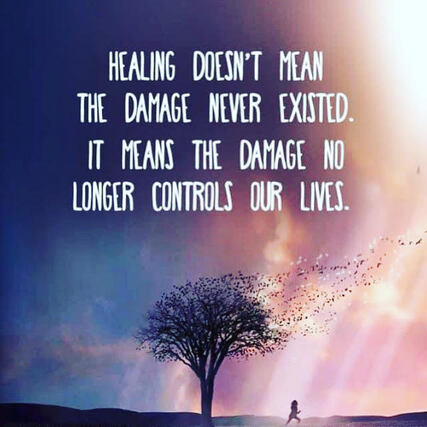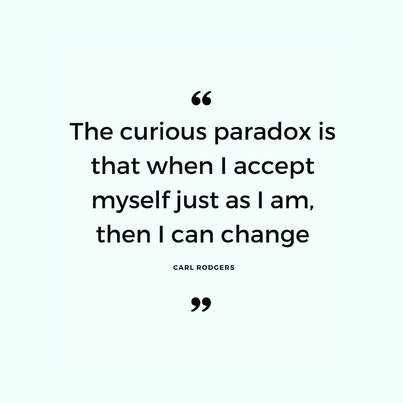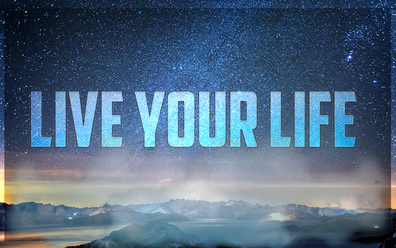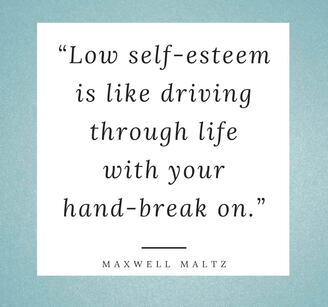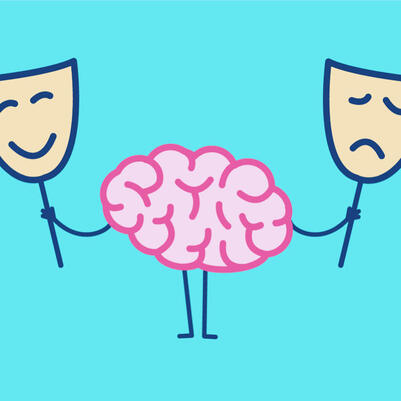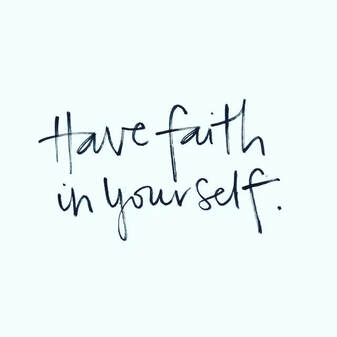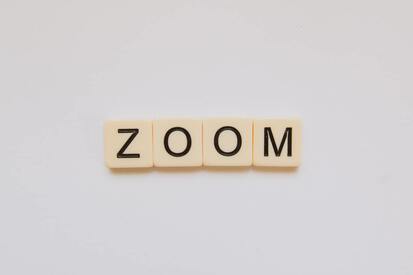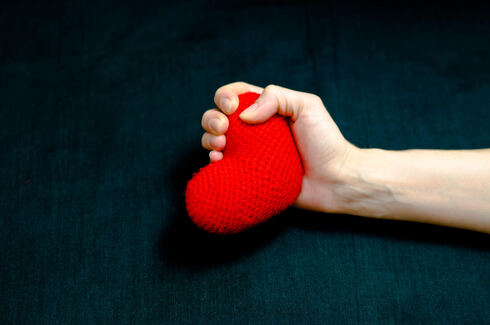
What keeps us tethered to repetitive relational patterns
Attachment is considered an important theory that underpins most kinds of therapy.It proposes that we will each adopt one of four attachment styles as a result of our experience in early life.
The way we experience early life and particularly our relationships with primary caregivers impacts how we then go on to navigate the world and our relationships in later life. The four attachment styles are:
- Secure - where parenting has been responsive and ‘good enough’ (ie no such thing as perfect).
- Anxious - where core needs as a child haven’t been met, or there is inconsistency.
- Dismissive/avoidant/ambivalent - where core needs haven’t been met, and the child learns not to expect from others and become self-sufficient.
- Disorganised/chaotic/fearful - where the parent or caregiver has been frightened or frightening, and abuse may have featured. As a consequence the child has internalised negative and confusing core beliefs about themselves.
Awareness is key, but change is possible - in both our relationships with others and most importantly with ourselves.
*John Bowlby, British psychoanalyst (1907-1990)
- 6 June 2024

A window into greater understanding
We all have a ‘window of tolerance’ - a bandwidth in which we manage our daily lives with their normal ups and downs, personal to who we are.
But there are times when our ‘window’ will narrow, or push us out towards either ‘hyper’ (anxiety) or ‘hypo’ (low mood) feelings and responses.
Just useful, perhaps, to have an understanding of this when we are going through challenging times, because greater clarity of what’s happening for us (and why we’re behaving/feeling as we are), often brings with it greater self-compassion and an easing of symptoms.
.
- 22nd May 2024
We all have a ‘window of tolerance’ - a bandwidth in which we manage our daily lives with their normal ups and downs, personal to who we are.
But there are times when our ‘window’ will narrow, or push us out towards either ‘hyper’ (anxiety) or ‘hypo’ (low mood) feelings and responses.
Just useful, perhaps, to have an understanding of this when we are going through challenging times, because greater clarity of what’s happening for us (and why we’re behaving/feeling as we are), often brings with it greater self-compassion and an easing of symptoms.
.
- 22nd May 2024

Between the trigger and our response to it
There are times when we might dearly wish to turn back the clock and do things differently.
Maybe it’s a moment of disproportionate anger or retaliation.
‘Why did I react like that?’ is a good question. And if a certain response has become a habit, it’s arguably worth looking into.
But just as important is the message in this [truly brilliant] quote. What it tells us is that our power lies in the moment between what triggered us and our response to it.
If we can slow down the process, if we can pause if only for a second, and think (and feel) - if we understand and harness that moment - we have a much better chance of achieving a more positive outcome, one that we might not end up regretting.
- 4 April 2024

'Whatever age we are, we carry our previous ages’*
When people come to counselling, depending on what it is that has brought them, they may well find that the root of their issue lies in the past.
The amazing thing about human beings is that we can build good lives for ourselves, in spite of problems experienced in childhood and elsewhere. (Of course, the opposite can also be too).
But it isn’t unusual for issues to resurface or be triggered or to create problems for us later in life. The concept of the ‘inner child’ can be a useful one. In therapy terms, the inner child is the part of us which is the fundamental core of who we are, and who also carries the experiences of our early years. Depending on what we have experienced, the inner child may carry wounds that will affect the way we live our lives in adulthood, whether we are conscious of them or not.
The good news is that it is never too late. We cannot erase the past but we can address, acknowledge, process and move forward differently.
If the inner child is seen and embraced, it can be profoundly healing.
*Julia Samuel, author and psychotherapist
- 1 March 2024
When people come to counselling, depending on what it is that has brought them, they may well find that the root of their issue lies in the past.
The amazing thing about human beings is that we can build good lives for ourselves, in spite of problems experienced in childhood and elsewhere. (Of course, the opposite can also be too).
But it isn’t unusual for issues to resurface or be triggered or to create problems for us later in life. The concept of the ‘inner child’ can be a useful one. In therapy terms, the inner child is the part of us which is the fundamental core of who we are, and who also carries the experiences of our early years. Depending on what we have experienced, the inner child may carry wounds that will affect the way we live our lives in adulthood, whether we are conscious of them or not.
The good news is that it is never too late. We cannot erase the past but we can address, acknowledge, process and move forward differently.
If the inner child is seen and embraced, it can be profoundly healing.
*Julia Samuel, author and psychotherapist
- 1 March 2024

Re-framing New Year
It’s a funny thing but I have come to love January in recent years. It may not glow or twinkle (like it’s predecessor December) but it doesn’t demand or pressure either. January is quiet and dark and unassuming, and there’s something about that I now find restorative and calming.Whatever we feel about January, the New Year inevitably brings talk of ‘resolutions’. Personally, I’m not a fan. But recently somebody told me that, instead of making a list of resolutions, they choose just one word to set a gentle intention for themselves for their year ahead.
The word - which might be something like ‘growth’ or ‘compassion’ or ‘focus’ (whatever is appropriate for that year) - acts as a reminder when needed to help ground and reset.
There’s something about this that I really like, because instead of being [arguably] too specific or unattainable or punishing, as resolutions often are, it’s simple and personal and encouraging. However you decide to enter this New Year, wishing you good health and harmony.
- 1 January 2024
It’s a funny thing but I have come to love January in recent years. It may not glow or twinkle (like it’s predecessor December) but it doesn’t demand or pressure either. January is quiet and dark and unassuming, and there’s something about that I now find restorative and calming.Whatever we feel about January, the New Year inevitably brings talk of ‘resolutions’. Personally, I’m not a fan. But recently somebody told me that, instead of making a list of resolutions, they choose just one word to set a gentle intention for themselves for their year ahead.
The word - which might be something like ‘growth’ or ‘compassion’ or ‘focus’ (whatever is appropriate for that year) - acts as a reminder when needed to help ground and reset.
There’s something about this that I really like, because instead of being [arguably] too specific or unattainable or punishing, as resolutions often are, it’s simple and personal and encouraging. However you decide to enter this New Year, wishing you good health and harmony.
- 1 January 2024
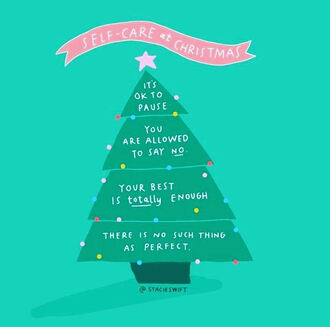
Inviting in a gentle Christmas
Christmas … the most talked about side issue in the therapy room.
Whatever someone is going through, the festivities aren’t likely to always help (and can often be a ‘flashpoint’ for feelings previously held at bay). Whether it’s the need to achieve ‘perfection’ for others (whatever that is), or spending time with people who don’t make us feel great, or feeling acutely the loss of someone special, or a sense of permeating loneliness.
Of course we wish it to be different - but it’s okay not to feel okay at this time of year, and you aren’t alone. If there are parts of Christmas that you like, no matter how small, enjoy them. Try not to overextend yourself. Take time for yourself, if you can. Reach out if you need to (some contact details attached). Know that it will soon be over. And perhaps next year will be different.
Whatever you are doing and however you are feeling, wishing you a peaceful and gentle Christmas.
- 7 December 2023
Christmas … the most talked about side issue in the therapy room.
Whatever someone is going through, the festivities aren’t likely to always help (and can often be a ‘flashpoint’ for feelings previously held at bay). Whether it’s the need to achieve ‘perfection’ for others (whatever that is), or spending time with people who don’t make us feel great, or feeling acutely the loss of someone special, or a sense of permeating loneliness.
Of course we wish it to be different - but it’s okay not to feel okay at this time of year, and you aren’t alone. If there are parts of Christmas that you like, no matter how small, enjoy them. Try not to overextend yourself. Take time for yourself, if you can. Reach out if you need to (some contact details attached). Know that it will soon be over. And perhaps next year will be different.
Whatever you are doing and however you are feeling, wishing you a peaceful and gentle Christmas.
- 7 December 2023
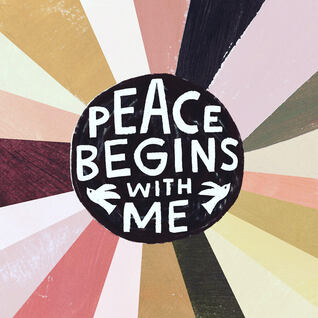
Back to basics
People come to counselling for all kinds of reasons. It may be anxiety or low mood, stress or loss (or any number of other ‘presenting issue’).
But what underpins them all is the relationship we have with ourselves and others - the former being most important of all.
When we understand ourselves a little better, when our self awareness is increased and we can view our behaviours and impulses and triggers more clearly - and gain a better understanding of where they come from - we become better placed to be our authentic selves.
From here we can move forward with greater self-compassion and assuredness.
- 1 December 2023
People come to counselling for all kinds of reasons. It may be anxiety or low mood, stress or loss (or any number of other ‘presenting issue’).
But what underpins them all is the relationship we have with ourselves and others - the former being most important of all.
When we understand ourselves a little better, when our self awareness is increased and we can view our behaviours and impulses and triggers more clearly - and gain a better understanding of where they come from - we become better placed to be our authentic selves.
From here we can move forward with greater self-compassion and assuredness.
- 1 December 2023
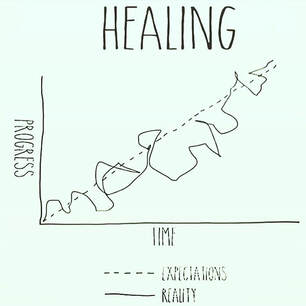
Healing isn't linear
One of my favourite images … Often we expect progress or healing to be straightforward and linear. The reality is more likely to include dips, loops and plateaus. But as long as the trajectory is upward over time, we’re getting somewhere. The important thing is to try to be kind to ourselves in the process. Limit expectations. Notice what it is that we are feeling in any given moment, without judgement. Embrace the ‘wins’.
Knowing that healing isn’t linear is an important part of most of our journeys.
- 14 November 2023
One of my favourite images … Often we expect progress or healing to be straightforward and linear. The reality is more likely to include dips, loops and plateaus. But as long as the trajectory is upward over time, we’re getting somewhere. The important thing is to try to be kind to ourselves in the process. Limit expectations. Notice what it is that we are feeling in any given moment, without judgement. Embrace the ‘wins’.
Knowing that healing isn’t linear is an important part of most of our journeys.
- 14 November 2023
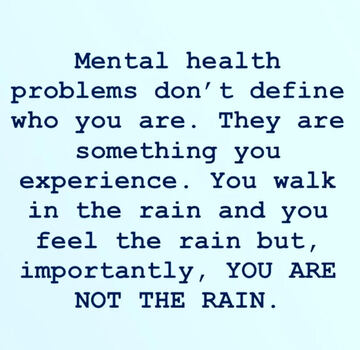
Distancing ourselves from the rain
Everybody has mental health, just as we all have physical health. And just as with physical health, it’s whether we feel well or otherwise that’s important. It’s changing, but we still tend to be far more understanding and sympathetic of physical health concerns or symptoms, not only in others but ourselves too.
But here’s the thing: none of us are immune from experiencing difficulty with our mental health at times during our lives (big, small, and everything in-between).
Often it just takes the wrong circumstance at the wrong time. Sometimes it can be a multitude of things creating our own perfect storm. And sometimes it can be difficult to pin down.
But if we can accept how we’re feeling (which doesn’t mean we have to like it), we can then do something about it.
And just like with physical health, mental health problems do not define who we are.
- 3 October 2023
Everybody has mental health, just as we all have physical health. And just as with physical health, it’s whether we feel well or otherwise that’s important. It’s changing, but we still tend to be far more understanding and sympathetic of physical health concerns or symptoms, not only in others but ourselves too.
But here’s the thing: none of us are immune from experiencing difficulty with our mental health at times during our lives (big, small, and everything in-between).
Often it just takes the wrong circumstance at the wrong time. Sometimes it can be a multitude of things creating our own perfect storm. And sometimes it can be difficult to pin down.
But if we can accept how we’re feeling (which doesn’t mean we have to like it), we can then do something about it.
And just like with physical health, mental health problems do not define who we are.
- 3 October 2023
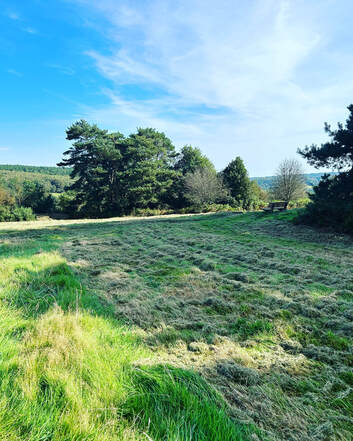
The simple powers of gratitude, nature and movement
On my walk this morning, head full of thoughts and concerns, I was suddenly (literally) stunned by the smell of cut grass. It must have been cut not long before I passed by because the scent was so strong and beautiful. It really took me out of my own head in that moment, which I was grateful for. And it reminded me of three things:
- 16 September 2023
On my walk this morning, head full of thoughts and concerns, I was suddenly (literally) stunned by the smell of cut grass. It must have been cut not long before I passed by because the scent was so strong and beautiful. It really took me out of my own head in that moment, which I was grateful for. And it reminded me of three things:
- The power of gratitude - sounds schmalzy, and in a class alongside ‘be kind to yourself’ and ‘this too shall pass’- but I make no apologies because all these sayings are rooted in truth.
- The power of nature - so much research out there to prove the restorative, healing and necessary benefits of spending time with nature, be that a forest, park, beach, garden or simple pots filled at home.
- The power of movement - getting that body going, if you can, to bring improvement to the mind …. because I don’t know about anybody else, but I’ve never returned from a walk feeling worse than when I started out.
- 16 September 2023
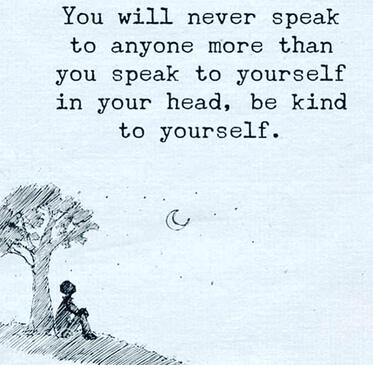
Finding a way out of unhealthy cycles
Never a truer word spoken. We all speak to ourselves, pretty much constantly, within our own internal worlds. Most of the time we’re not even aware.
For some people their personal narrative is encouraging and supportive (‘I’ve got this, even though I’m nervous!’), whilst for others theirs has a far more negative bias (‘I’m so stupid/worthless/not good enough’).
Counselling gives the opportunity, once trust has been established, to share some of these internal thoughts. And once out in the open, they can then be faced, queried, challenged, re-assessed.
As a counsellor, these thoughts are often painful to listen to, as it becomes clear what a client has been quietly living with (a negative internal monologue isn’t dissimilar to living with an abusive partner in our own heads).
Some of the most wonderful moments in the therapy room are when clients free themselves from unjustified core negative beliefs, thoughts and behaviours, and begin to speak to themselves as they would a friend … with a little compassion and kindness.
And from this point great things can happen.
- 9 September 2023
Never a truer word spoken. We all speak to ourselves, pretty much constantly, within our own internal worlds. Most of the time we’re not even aware.
For some people their personal narrative is encouraging and supportive (‘I’ve got this, even though I’m nervous!’), whilst for others theirs has a far more negative bias (‘I’m so stupid/worthless/not good enough’).
Counselling gives the opportunity, once trust has been established, to share some of these internal thoughts. And once out in the open, they can then be faced, queried, challenged, re-assessed.
As a counsellor, these thoughts are often painful to listen to, as it becomes clear what a client has been quietly living with (a negative internal monologue isn’t dissimilar to living with an abusive partner in our own heads).
Some of the most wonderful moments in the therapy room are when clients free themselves from unjustified core negative beliefs, thoughts and behaviours, and begin to speak to themselves as they would a friend … with a little compassion and kindness.
And from this point great things can happen.
- 9 September 2023
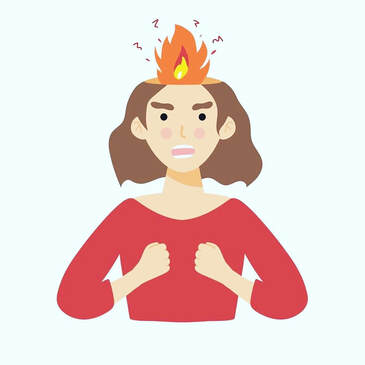
Reframing anger
Some thoughts about anger - a necessary human emotion, just like all others. But not one we are generally comfortable feeling.
Often, anger is explored in the therapy room as something to be ashamed of, embarrassed about, hidden, it not being felt to be a terribly ‘socially acceptable’ state. But it is a normal human reaction that often - if listened to - is telling us something important, and can be a good agent for change.
The thing about anger is that it is considered to be a ‘secondary’ emotion. So what if anger wasn’t there? What might we be feeling underneath - sadness, guilt, grief, hurt, shame, disappointment?
Anger takes a lot of energy, and ideally isn’t experienced for too long. Expressing anger is a tricky thing (but suppressing it is trickier, and can lead to low mood and depression). Sometimes it’s appropriate and necessary. Sometimes it’s misplaced, disproportionate and shaming. The following model is called ASDA (which I love), and it’s basic premise is:
A - Appropriate (right time, right place, right person, right expression …)
S - Spontaneous (avoid suppression or bottling up)
D - Direct (be clear about why you’re angry)
A - Assertive (avoid passivity or aggression; assert your own view, and respect the other person’s right to do the same).
Models like this can help support us to express our anger in a more productive way.
One final thought (picked up from the wonderful @bestfriendtherapy podcast): ‘If you grew up with an angry man in your house, you will always have an angry man in your house [in one guise or another]’. Perhaps something to gently consider, if appropriate.
- 23 July 2023
Some thoughts about anger - a necessary human emotion, just like all others. But not one we are generally comfortable feeling.
Often, anger is explored in the therapy room as something to be ashamed of, embarrassed about, hidden, it not being felt to be a terribly ‘socially acceptable’ state. But it is a normal human reaction that often - if listened to - is telling us something important, and can be a good agent for change.
The thing about anger is that it is considered to be a ‘secondary’ emotion. So what if anger wasn’t there? What might we be feeling underneath - sadness, guilt, grief, hurt, shame, disappointment?
Anger takes a lot of energy, and ideally isn’t experienced for too long. Expressing anger is a tricky thing (but suppressing it is trickier, and can lead to low mood and depression). Sometimes it’s appropriate and necessary. Sometimes it’s misplaced, disproportionate and shaming. The following model is called ASDA (which I love), and it’s basic premise is:
A - Appropriate (right time, right place, right person, right expression …)
S - Spontaneous (avoid suppression or bottling up)
D - Direct (be clear about why you’re angry)
A - Assertive (avoid passivity or aggression; assert your own view, and respect the other person’s right to do the same).
Models like this can help support us to express our anger in a more productive way.
One final thought (picked up from the wonderful @bestfriendtherapy podcast): ‘If you grew up with an angry man in your house, you will always have an angry man in your house [in one guise or another]’. Perhaps something to gently consider, if appropriate.
- 23 July 2023
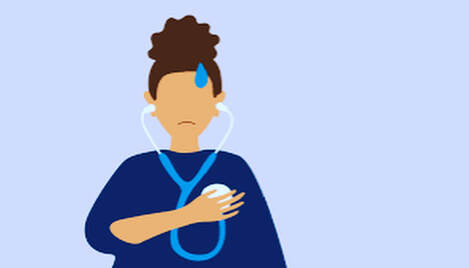
Finding a way out of unhealthy cycles
Being concerned about our health is normal and important. But when concern becomes habitual and all consuming, something needs to change.
Health anxiety is a particular and particularly distressing form of anxiety, in which the sufferer becomes immersed in an unpleasant and repetitive cycle of worry, catastrophising, checking and re-checking.
Often (but not always) this particular presenting issue has roots in early life, perhaps if a person has experienced ill health themselves, or been aware and affected by somebody else’s ill health. This can be important and useful to explore.
Ultimately though, the key out of this distressing cycle is to challenge each stage, and to reframe (with practise) thoughts and feelings in order to find a new way of being, free from debilitating and unhelpful worry and concern.
- 7 June 2023
Being concerned about our health is normal and important. But when concern becomes habitual and all consuming, something needs to change.
Health anxiety is a particular and particularly distressing form of anxiety, in which the sufferer becomes immersed in an unpleasant and repetitive cycle of worry, catastrophising, checking and re-checking.
Often (but not always) this particular presenting issue has roots in early life, perhaps if a person has experienced ill health themselves, or been aware and affected by somebody else’s ill health. This can be important and useful to explore.
Ultimately though, the key out of this distressing cycle is to challenge each stage, and to reframe (with practise) thoughts and feelings in order to find a new way of being, free from debilitating and unhelpful worry and concern.
- 7 June 2023
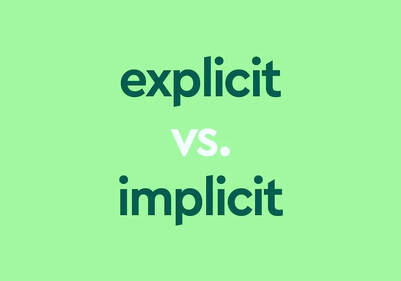
Chose clarity over ambiguity
There are benefits to seeking clarity if we are left feeling unsure, offended, or even a little ashamed after an exchange with someone.
Perhaps a conversation has left us feeling confused about something that was said, where our feelings are left hurt, or we might feel a bit attacked, but we are maybe too embarrassed or fearful to ask for a greater explanation.
Maybe it won’t be the first time that we have been left feeling like this by that person, or others.
If we can find the courage (something which often increases in therapy, along with self-worth) to push through this embarrassment or fear and begin to develop a habit of gently and curiously enquiring as to what the other person meant, one of two things is likely to happen:
(1) we discover that we may have got the wrong end of the stick, that that person meant no harm, that we assumed something that was probably based on something else - but we are now clear and can let it go, rather than leaving it to fester and cause greater harm unnecessarily.
Or (2), we find that that person did, in fact, mean to wound, but they have now been exposed.
Shady or outdated behaviour tends to hide in the implicit. If we turn a light on it (by being explicit) it tends to change. And that can be a revolutionary thing.
“Explicit describes something as being expressed directly without anything being implied. Implicit describes things in which a meaning is implied or hinted at rather than being expressed directly.”
- 19 May 2023
There are benefits to seeking clarity if we are left feeling unsure, offended, or even a little ashamed after an exchange with someone.
Perhaps a conversation has left us feeling confused about something that was said, where our feelings are left hurt, or we might feel a bit attacked, but we are maybe too embarrassed or fearful to ask for a greater explanation.
Maybe it won’t be the first time that we have been left feeling like this by that person, or others.
If we can find the courage (something which often increases in therapy, along with self-worth) to push through this embarrassment or fear and begin to develop a habit of gently and curiously enquiring as to what the other person meant, one of two things is likely to happen:
(1) we discover that we may have got the wrong end of the stick, that that person meant no harm, that we assumed something that was probably based on something else - but we are now clear and can let it go, rather than leaving it to fester and cause greater harm unnecessarily.
Or (2), we find that that person did, in fact, mean to wound, but they have now been exposed.
Shady or outdated behaviour tends to hide in the implicit. If we turn a light on it (by being explicit) it tends to change. And that can be a revolutionary thing.
“Explicit describes something as being expressed directly without anything being implied. Implicit describes things in which a meaning is implied or hinted at rather than being expressed directly.”
- 19 May 2023
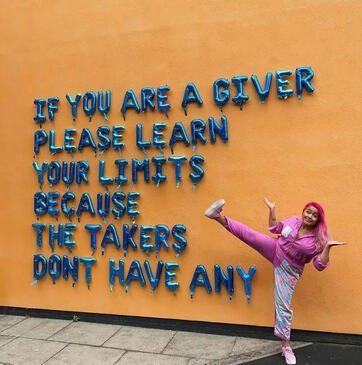
Knowing your limits
Something that often comes up in the therapy room, as clients tentatively begin to explore who they really are, where their 'giving' comes from and how they might move forward differently.
An example might be a parent/adult child relationship, where much is expected of the latter. Or a friendship which feels one-sided and unsatisfying, or even toxic. Where more is given than received, leaving the ‘giver’ at times feeling resentful, demoralised, depressed, not wholly themselves.
The thought of establishing boundaries can seem scary, or even impossible. Often the run up feels worse than the actuality. Playing devil’s advocate for a second, if others don’t know where our personal boundaries lie, how can we expect them to know they are crossing them?
But once boundaries are established, and if they are still being crossed (because those boundaries may not suit the ‘taker’), then perhaps that’s a different conversation.
- 14 May 2023
Something that often comes up in the therapy room, as clients tentatively begin to explore who they really are, where their 'giving' comes from and how they might move forward differently.
An example might be a parent/adult child relationship, where much is expected of the latter. Or a friendship which feels one-sided and unsatisfying, or even toxic. Where more is given than received, leaving the ‘giver’ at times feeling resentful, demoralised, depressed, not wholly themselves.
The thought of establishing boundaries can seem scary, or even impossible. Often the run up feels worse than the actuality. Playing devil’s advocate for a second, if others don’t know where our personal boundaries lie, how can we expect them to know they are crossing them?
But once boundaries are established, and if they are still being crossed (because those boundaries may not suit the ‘taker’), then perhaps that’s a different conversation.
- 14 May 2023
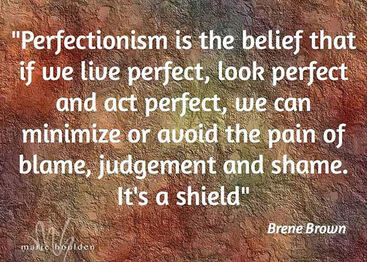
No such thing as perfect
I've been think a lot about 'perfectionism' lately, in relation to how this state of mind can negatively impact a person's life and mental health.
Needing to hold ourselves to ‘perfect’ standards - be it in relation to our parenting, our work, our relationships, our studies, etc - is likely to stem from us placing too much value on what the counselling world would call our ‘external locus of evaluation’. In other words, the real or feared opinions and judgements of others.
This unhelpful leaning may well be connected to experiences of high parental expectations, or critical or abusive occurrences or societal expectations, or cultural pressures.
The thing is …. and forgive me perhaps for stating the obvious …. perfect isn’t possible. It just isn’t. So if we’ve allowed ‘perfectionism’ to take hold, we’re on a hiding to nothing (at best).
Perfectionism is not only unattainable but also inevitably anxiety inducing. In addition, it is (and thanks to the wonderful Josephine Hughs of Good Enough Counsellors for this) incredibly addictive.
What we’re not talking about here is striving to be the best we can be, ie healthy achievement and growth (Brene Brown, the author of the great quote in this post’s pic, is very clear about this). But for some this can be a fine line.
What can free us from perfectionism is a little awareness, some exploration, self compassion and a gentle commitment to change.
One final thought on this topic to end, again from Josephine Hughs: ‘progress, not perfection’. Because if we always try to be ‘perfect’, we are always going to ‘fail’. And that’s a whole other story.
- 8 March 2023
I've been think a lot about 'perfectionism' lately, in relation to how this state of mind can negatively impact a person's life and mental health.
Needing to hold ourselves to ‘perfect’ standards - be it in relation to our parenting, our work, our relationships, our studies, etc - is likely to stem from us placing too much value on what the counselling world would call our ‘external locus of evaluation’. In other words, the real or feared opinions and judgements of others.
This unhelpful leaning may well be connected to experiences of high parental expectations, or critical or abusive occurrences or societal expectations, or cultural pressures.
The thing is …. and forgive me perhaps for stating the obvious …. perfect isn’t possible. It just isn’t. So if we’ve allowed ‘perfectionism’ to take hold, we’re on a hiding to nothing (at best).
Perfectionism is not only unattainable but also inevitably anxiety inducing. In addition, it is (and thanks to the wonderful Josephine Hughs of Good Enough Counsellors for this) incredibly addictive.
What we’re not talking about here is striving to be the best we can be, ie healthy achievement and growth (Brene Brown, the author of the great quote in this post’s pic, is very clear about this). But for some this can be a fine line.
What can free us from perfectionism is a little awareness, some exploration, self compassion and a gentle commitment to change.
One final thought on this topic to end, again from Josephine Hughs: ‘progress, not perfection’. Because if we always try to be ‘perfect’, we are always going to ‘fail’. And that’s a whole other story.
- 8 March 2023
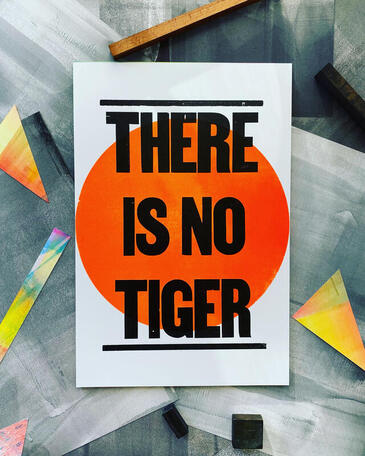
When anxiety goes too far
Anxiety - although not the most pleasant of feelings - is a necessary and normal emotion, just like any other. An example I often give to clients is that, if a tiger jumped up at the window, we’d need to react quickly in order to survive, and anxiety would help us with that.
But sometimes anxiety can go too far, especially when it is persistent and lingers for longer than we’d like.
The 6 symptoms which might lead to a diagnosis of Generalised Anxiety Disorder (GAD), according to DSM-V, are: Restlessness, Fatigue, Irritability, Muscle tension, Sleep disturbance, Concentration difficulties (3 symptoms or more are needed for diagnosis in an adult, one for a child).
The thing is, a tiger jumping up at the window isn’t terribly likely these days (feel free to transpose tiger with any other animal or threat), but it was when our human responses to danger were developed thousands of years ago. Our responses haven’t changed, but circumstances have.
Recently, I attended a refresher course on anxiety in which the brilliant trainer shared a video in which a tiger was used to help explain how - in the grip of anxiety - we need to first understand what (and what isn’t) going on for us individually.
The important thing to remember is that anxiety is normal, it will pass, but it might take a little work and introspection to get there. But you won’t be alone, and there definitely won’t be any tigers.
* For the tiger video, look for ‘The Best Bartender in Chicago’, on YouTube (Nie Ma Tygrysa).
- 12 February 2023
Anxiety - although not the most pleasant of feelings - is a necessary and normal emotion, just like any other. An example I often give to clients is that, if a tiger jumped up at the window, we’d need to react quickly in order to survive, and anxiety would help us with that.
But sometimes anxiety can go too far, especially when it is persistent and lingers for longer than we’d like.
The 6 symptoms which might lead to a diagnosis of Generalised Anxiety Disorder (GAD), according to DSM-V, are: Restlessness, Fatigue, Irritability, Muscle tension, Sleep disturbance, Concentration difficulties (3 symptoms or more are needed for diagnosis in an adult, one for a child).
The thing is, a tiger jumping up at the window isn’t terribly likely these days (feel free to transpose tiger with any other animal or threat), but it was when our human responses to danger were developed thousands of years ago. Our responses haven’t changed, but circumstances have.
Recently, I attended a refresher course on anxiety in which the brilliant trainer shared a video in which a tiger was used to help explain how - in the grip of anxiety - we need to first understand what (and what isn’t) going on for us individually.
The important thing to remember is that anxiety is normal, it will pass, but it might take a little work and introspection to get there. But you won’t be alone, and there definitely won’t be any tigers.
* For the tiger video, look for ‘The Best Bartender in Chicago’, on YouTube (Nie Ma Tygrysa).
- 12 February 2023
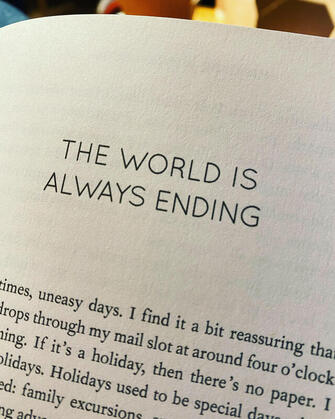
Ageing well through fearing less (and other things)
I am reading a book called The Swedish Art of Ageing Well (I turned 50 last summer and I'm finding it an interesting milestone). One of the chapters is called 'The World is Always Ending', the premise being that - no matter what age we live in - there always seems to be something huge to be fearful about.
The author, in her 80s, writes: 'I lived through World War II, the Cold War, the Cuban Missile Crisis, Chernobyl - and now climate change'. It reminded me of something my dad said years ago, that he felt (or had read) that there is something about the human psyche that needs to be kept on it's toes; that it consistently needs to be afraid of something big - whether real and possible or otherwise.
I have found these words immensely comforting over the years, when things felt distressing and bleak ... in a kind of 'This Too Shall Pass' hopefulness ... along with making sure that I limit my news intake at times.
It's not about naivety or looking the other way, it's about protecting our mental health during difficult times. Doing what we can, if there is anything to be done, and then mentally letting go. Because otherwise undue stress and anxiety abound, with little point or benefit. The author finishes her chapter introduction: 'Here's how to cope with eighty years of constant doom and hold on to your sense of humour'.
And talking of ageing, a final thought, a quote that has become dear to me for various reasons over the years (shared by my wonderful supervisor, but whose author I cannot find), 'Growing old is a privilege denied to the many'. It really is.
- 16 January 2023
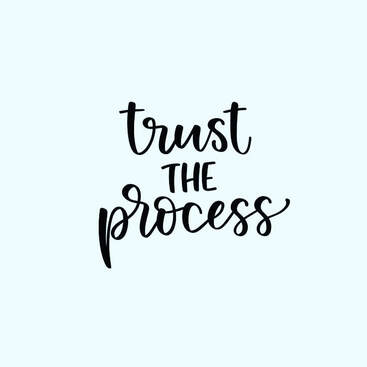
You've got this (you just mightn't be able to see it yet)
My work is a privilege. I get to know and spend time with people in a way that isn’t like any other relationship. It’s an alliance which is purely in service of that person; it’s professional and boundaried but also real and empathic and without judgement.
Sometimes the work is hard, uplifting, distressing, surprising, stuck, frustrating, joyful. All of those things. I never know what a client will bring in on any given day, even if we have worked together for some time.
The thing is, counselling is not a job that can easily be defined or the work clearly mapped out in advance. I guess that’s why the phrase ‘trust the process’ is so often linked to counselling and psychotherapy. Another way of saying it would be ‘trust yourself, you’ve got the answers, you just don’t know it yet’. And when a client finds their own answers, it’s wonderful.
- 20 November 2022
My work is a privilege. I get to know and spend time with people in a way that isn’t like any other relationship. It’s an alliance which is purely in service of that person; it’s professional and boundaried but also real and empathic and without judgement.
Sometimes the work is hard, uplifting, distressing, surprising, stuck, frustrating, joyful. All of those things. I never know what a client will bring in on any given day, even if we have worked together for some time.
The thing is, counselling is not a job that can easily be defined or the work clearly mapped out in advance. I guess that’s why the phrase ‘trust the process’ is so often linked to counselling and psychotherapy. Another way of saying it would be ‘trust yourself, you’ve got the answers, you just don’t know it yet’. And when a client finds their own answers, it’s wonderful.
- 20 November 2022

In acceptance we stop fighting and begin adapting
This leaf fell down in front of me on my morning walk. It's been up there all this time, since early Spring, through the hot summer, and now for it's final act, to let go, it's life's work complete.
It made me think of a conversation I had with another therapist recently about a difficult situation. A wise and wonderful woman, she said: ‘You know Aveline, everything that breaths will die’. It stopped me in my tracks for a second. Whilst I know this intellectually to be true, I struggle with it - like most people - emotionally. Because where there is life there is always hope.
When the end comes (and we hope that is after a long and fruitful life, not always so), grief is hard for those left behind. Models of grief can be helpful, but there are no set rules or patterns. Each experience and timeline is different, and there will almost inevitably be curveballs along the way through the processing of the loss. Grief is the price we pay for love, or the shared experience of that person now gone. Acceptance doesn’t mean that we approve or like what has happened, it means that we stop fighting for the situation to be different and begin adapting to a new way of being.
The most important thing to remember in all of this is to be kind to yourself whilst in grief. There is no right way to grieve, and no one can or should tell us how to grieve or how long to grieve for. In the words of Elizabeth Kubler-Ross (another wise woman): ‘If you do not take the time to grieve, you cannot find a future in which loss is remembered and honoured without pain’.
* On Grief and Grieving, Elizabeth Kubler-Ross and David Kessler
- 7 November 2022
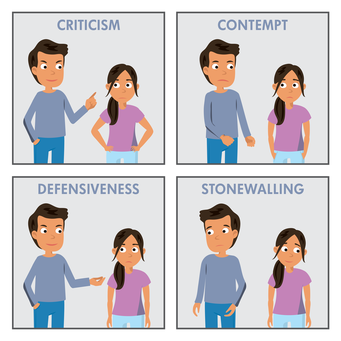
The Four Horsemen of the Apocalypse ...
... or in other words, the four ways of communicating identified as being most likely to destroy trust, intimacy and, ultimately, a relationship: criticism (verbally attacking), contempt (belittling, denigrating), defensiveness (blocking or retaliating against perceived slights), and stonewalling (withdrawing, distancing).
Negative communication patterns between partners can easily become a destructive habit.
The good news is that there are antidotes. For example, learning to take responsibility when appropriate, instead of being instantly defensive. Or starting to build a culture of appreciation as an alternative to leaping to contempt. But first the Four Horsemen - either all or some - need to be identified and acknowledged as being at play within a relationship. And then the process of positive change can begin.
* The Gottman Institute
‘
- 27 October 2022
... or in other words, the four ways of communicating identified as being most likely to destroy trust, intimacy and, ultimately, a relationship: criticism (verbally attacking), contempt (belittling, denigrating), defensiveness (blocking or retaliating against perceived slights), and stonewalling (withdrawing, distancing).
Negative communication patterns between partners can easily become a destructive habit.
The good news is that there are antidotes. For example, learning to take responsibility when appropriate, instead of being instantly defensive. Or starting to build a culture of appreciation as an alternative to leaping to contempt. But first the Four Horsemen - either all or some - need to be identified and acknowledged as being at play within a relationship. And then the process of positive change can begin.
* The Gottman Institute
‘
- 27 October 2022
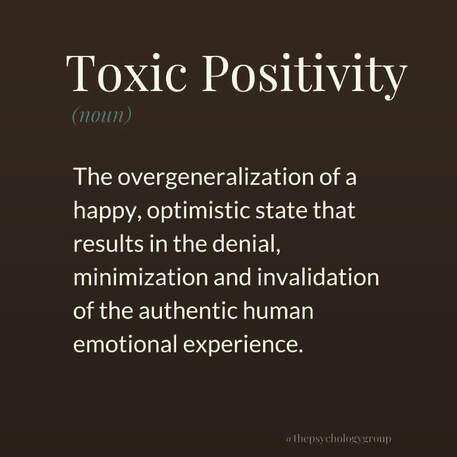
Knowing when 'positivity' isn't appropriate
Sometimes it can be helpful to encourage ourselves to try and think a little more positively. And sometimes it absolutely isn’t (especially if that positivity is imposed by others, well-meaning or otherwise, because that’s about their ‘stuff’ and not yours).
Sometimes we need to allow ourselves to feel and accept exactly how we’re feeling, no matter how difficult or painful. Because if we don’t, it will be so much tougher to find our way out.
Psychotherapist Whitney Goodman looks deeply into this subject in her book ‘Toxic Positivity’ @sitwithwhit
- 9 October 2022

Seeking clarity through 'The Window'
‘The Window’ … a simple activity that can be useful in therapy when we are feeling a little stuck, or at a crossroads in our lives.
Take a piece of paper and draw a large square with a cross in the middle (like a window with four glass panes).
Then - and definitely without worrying about artistic ability - draw the first thing that comes into your mind in each of the window panes:
Top left: the past.
Top right: the present.
Bottom left: feared future.
Bottom right: hoped for future.
This activity can help bring clarity about where we are in our lives, where we’ve come from, and our thoughts about what we want (and more importantly what we don’t want) moving forward.
Once we have our [often subconscious] thoughts in front of us, agency and effective action can begin to follow.
- 29 August 2022
‘The Window’ … a simple activity that can be useful in therapy when we are feeling a little stuck, or at a crossroads in our lives.
Take a piece of paper and draw a large square with a cross in the middle (like a window with four glass panes).
Then - and definitely without worrying about artistic ability - draw the first thing that comes into your mind in each of the window panes:
Top left: the past.
Top right: the present.
Bottom left: feared future.
Bottom right: hoped for future.
This activity can help bring clarity about where we are in our lives, where we’ve come from, and our thoughts about what we want (and more importantly what we don’t want) moving forward.
Once we have our [often subconscious] thoughts in front of us, agency and effective action can begin to follow.
- 29 August 2022
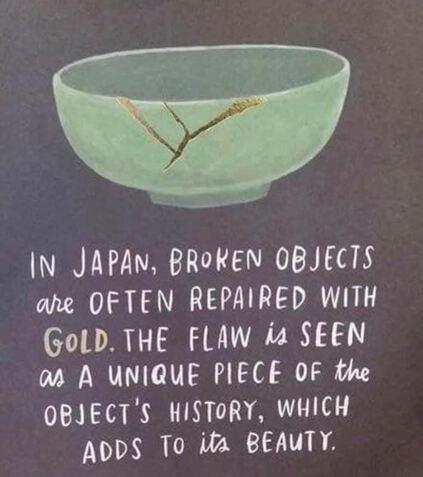
Healing for greater strength
Things I would pay good money for in service of my clients (and myself, frankly!): a magic wand, a crystal ball, and a rubber to erase past difficult experiences.
In the absence of these things, what we have is the knowledge that the past can help inform us as to how we got to where we are now (not only physically, but relationally, mentally and emotionally).
Talking therapeutically then offers the opportunity to gain greater clarity over our lives, increase self-compassion, and give us a much better idea of how we want to move forward for ourselves.
Past traumas or experiences can’t be undone. But we can become stronger than we were before.
*Kintsugi, the Japanese art of ‘golden joinery, or golden repair’
- 13 August 2022

Seeing the wood for the trees
Sometimes it can be hard to see the way forward. Talking helps. Not by being given the ‘answers’ (only we ourselves can determine those) but by gaining clarity over our thoughts and feelings. And then comes the possibility of beginning to see the wood for the trees, for ourselves.
- 26 June 2022
Sometimes it can be hard to see the way forward. Talking helps. Not by being given the ‘answers’ (only we ourselves can determine those) but by gaining clarity over our thoughts and feelings. And then comes the possibility of beginning to see the wood for the trees, for ourselves.
- 26 June 2022
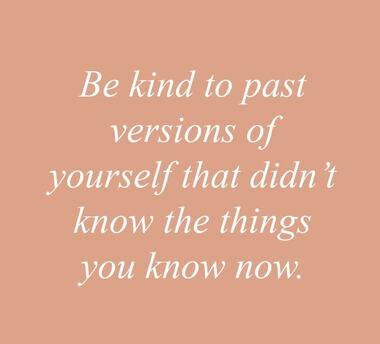
The importance of self-compassion
It’s one thing to struggle with something that has happened to us … it’s another coming to terms with how we dealt with that experience. This can leave us with residual or debilitating feelings of regret or shame, anger or even disappointment in ourselves.
Becoming more self aware through therapy can help us begin to unpick our past responses. Why did I do that? Why did I put up with that? Why didn’t I stand up for myself? Why did I collude? (or whatever it is that we’re left feeling). Once we begin to understand ourselves a bit better … and what led us to be the people we are (or were) … greater self-compassion can follow. Two things can then happen: acceptance and healing.
- 28 May 2022
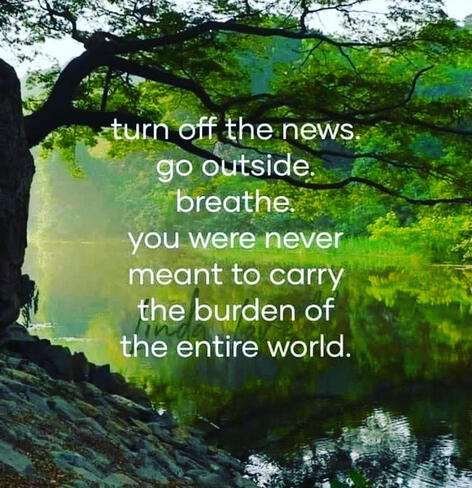
Be mindful of what you take on
This really speaks to me. A lifelong news devotee, I no longer expose myself to the same quantity of news as often as I used to. It’s not about denial, it’s about taking greater care about what I’m willing to take on. It’s about boundaries. Because this pic is right, we aren’t meant (or built) to carry the burden of an entire world. And there is a cost if we try … with arguably little benefit to anyone.
Absorb what we need … do what we can … focus on the little things.
- 15 May 2022
This really speaks to me. A lifelong news devotee, I no longer expose myself to the same quantity of news as often as I used to. It’s not about denial, it’s about taking greater care about what I’m willing to take on. It’s about boundaries. Because this pic is right, we aren’t meant (or built) to carry the burden of an entire world. And there is a cost if we try … with arguably little benefit to anyone.
Absorb what we need … do what we can … focus on the little things.
- 15 May 2022
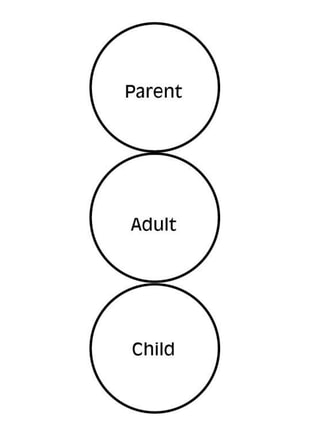
Being aware of how we communicate, and why
PAC can be a really useful (and simple) way to help us understand how we relate and communicate with others.
According to this model*, we each have within ourselves a ‘Parent’, ‘Adult’ and ‘Child’ mode (hence PAC). Which mode we use at any one time will largely depend on the circumstance we find ourselves in and who we are talking to; also - and arguably more importantly - what our life experiences have been so far.
In an ideal world perhaps we would all communicate with each other from our ‘Adult’ at all times (rational, logical …) but life isn’t like that.
If we can stand back from our lives for a moment and gain a little clarity over what we do and why, we move closer to the possibility of greater self-awareness and helpful change .
*Eric Berne’s Transactional Analysis
- 24 April 2022
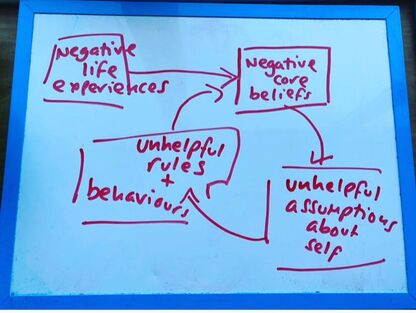
Letting go of negative (and false) core beliefs
The trusty whiteboard - a handy tool in the therapy room on which to share ways of unpicking and moving on from unhelpful thoughts and behaviours (forgive my handwriting!).
The premise behind this particular model: negative core beliefs we hold about ourselves (for example: ‘I’m not loveable’, or ‘I’m not good enough’) lead us to take on unhelpful assumptions (‘I won’t be wanted’, ‘I’ll make myself look ridiculous’) which then means that we follow unhelpful and self imposed rules (‘there’s no point in trying’ or ‘I mustn’t risk putting myself out there’).
Just standing back for a minute, and looking to see what assumptions and rules we are living by can help us to see how we are restricting or even sabotaging our own lives and potential.
But perhaps first we need to work out how the negative core beliefs came to be in the first place …. what were the negative life experiences that led to us taking on such harsh beliefs about ourselves?
Maybe it’s worth revisiting those experiences now (times in childhood, school, old relationships, previous work situations) and asking ourselves whether these experiences actually have any merit? Or whether we can now see them in a different light (other people’s ‘stuff’ maybe?).
And then perhaps we can finally untether ourselves and break the cycle.
With thanks: Practical CBT
- 17 April 2022
The trusty whiteboard - a handy tool in the therapy room on which to share ways of unpicking and moving on from unhelpful thoughts and behaviours (forgive my handwriting!).
The premise behind this particular model: negative core beliefs we hold about ourselves (for example: ‘I’m not loveable’, or ‘I’m not good enough’) lead us to take on unhelpful assumptions (‘I won’t be wanted’, ‘I’ll make myself look ridiculous’) which then means that we follow unhelpful and self imposed rules (‘there’s no point in trying’ or ‘I mustn’t risk putting myself out there’).
Just standing back for a minute, and looking to see what assumptions and rules we are living by can help us to see how we are restricting or even sabotaging our own lives and potential.
But perhaps first we need to work out how the negative core beliefs came to be in the first place …. what were the negative life experiences that led to us taking on such harsh beliefs about ourselves?
Maybe it’s worth revisiting those experiences now (times in childhood, school, old relationships, previous work situations) and asking ourselves whether these experiences actually have any merit? Or whether we can now see them in a different light (other people’s ‘stuff’ maybe?).
And then perhaps we can finally untether ourselves and break the cycle.
With thanks: Practical CBT
- 17 April 2022
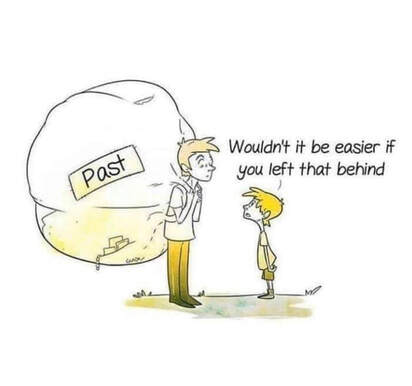
Putting the past down
The 'here and now' is kind of a big thing in therapy ... it relates to what's going on in the moment between client and therapist - from which so much can be learned.
The past is important, but only as much as it helps us understand how we got to this point. From here, we can explore, seek clarity, and the client begin to find a better way forward for themselves … which may involve putting the past down.
- 7 March 2022
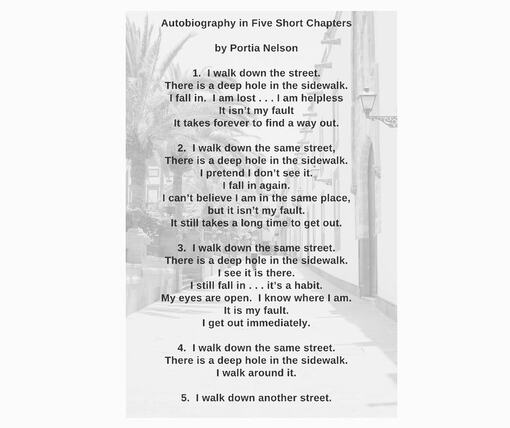
Choose another street
Unhelpful and repeated patterns of behaviour can be broken … but first they have to be spotted. Portia Nelson’s poem brilliantly depicts the process … whether we’re talking about a proclivity towards negative relationships, or self-limiting ways of being, or a tendency to put others first (to our detriment).
Walking down another street is possible. It takes acknowledgement of what is, a real honesty with self, and a willingness to change.
- 5 February 2022
Unhelpful and repeated patterns of behaviour can be broken … but first they have to be spotted. Portia Nelson’s poem brilliantly depicts the process … whether we’re talking about a proclivity towards negative relationships, or self-limiting ways of being, or a tendency to put others first (to our detriment).
Walking down another street is possible. It takes acknowledgement of what is, a real honesty with self, and a willingness to change.
- 5 February 2022
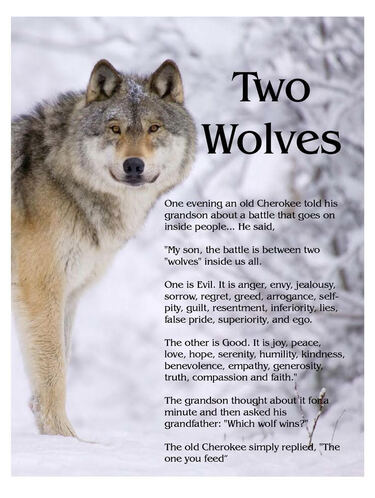
Which wolf will you feed?
I love this tale because it so brilliantly illustrates how, for many of us, healing from whatever it is that we’re dealing with, ultimately boils down to this: do I want recovery, and am I prepared to take a leap of faith/let go of old habits and behaviours/be authentically open to change?
At the end of the day, which wolf within me will I feed?
- 20 January 2022

Lowering the gaze
There are times in life when trying to look too far ahead can be overwhelming … especially at the beginning of a new year.
Sometimes it serves us better to lower our gaze a little and look at what’s in front of us … this week, this day, this hour even … that’s enough.
When something feels too much in a given moment, it usually is. And that’s when we need to listen to ourselves. Take a gentle breath, and just focus on the next step … one step at a time, just for now.
- 2 January 2022
There are times in life when trying to look too far ahead can be overwhelming … especially at the beginning of a new year.
Sometimes it serves us better to lower our gaze a little and look at what’s in front of us … this week, this day, this hour even … that’s enough.
When something feels too much in a given moment, it usually is. And that’s when we need to listen to ourselves. Take a gentle breath, and just focus on the next step … one step at a time, just for now.
- 2 January 2022
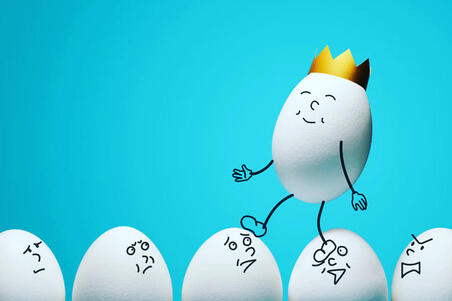
Growing up (and away) from narcissistic parenting
Every child deserves and has the right to feel safe, loved and nurtured (this isn’t just a throw-away comment, I believe this to my core). But it’s not like that for everybody.
Being the adult child of a narcissistic parent working through their experience can be deeply distressing, confusing, upsetting. As with most counselling presenting issues, recovery will ultimately be about acceptance. This doesn’t mean that we have to like something, but rather that we are no longer hoping for it to be different. Some points to maybe think about if you are the adult child of a narcissistic parent:
- A narcissistic mother is arguably likely to be more damaging than a narcissistic father (see next point).
- Society views mothers as kind, loving, giving, benevolent (Mother Earth, Mother Nature ….) but not all mothers are like this. Because of this societal expectation, the child is likely to feel shame and deny their own experience.
- A narcissistic parent is incapable of feeling for others, including their own child (possibly the worlds greatest taboo?).
- Blockers to recovery are likely to include the adult child gaslighting themselves (ie, I wasn’t abused, I had food and clothes, what am I even complaining about …..).
- It can help with the process to look at how, when and why that person became narcissistic. Not for excuses but for explanations.
- How did you survive? Who did meet your core needs?
- What does your inner child want to say about what happened to you?How would your adult self now respond to your inner child?
- What do you want to say to your parent (within a safe environment)?
- There are more types of narcissist than just the archetypal ‘grandiose’.
- 19 December 2021
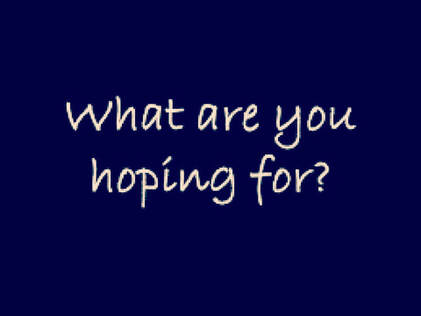
Being on page with hopes and expectations
Just about the two most important questions during a first counselling session … what’s brought you here now and what are you hoping to achieve?
It’s important to know what someone (or a couple) is hoping for, and what their expectations might be, as you begin working together as partners in this therapeutic process. Sometimes, as clients, we have a very clear idea of what we need or what we’re hoping for, and sometimes we don’t (and sometimes it changes over time) and that’s okay. Each client is unique, so too their presenting issues.
With these two questions explored we can then get to work, in whatever way feels best for that person..
- 20 November 2021
Just about the two most important questions during a first counselling session … what’s brought you here now and what are you hoping to achieve?
It’s important to know what someone (or a couple) is hoping for, and what their expectations might be, as you begin working together as partners in this therapeutic process. Sometimes, as clients, we have a very clear idea of what we need or what we’re hoping for, and sometimes we don’t (and sometimes it changes over time) and that’s okay. Each client is unique, so too their presenting issues.
With these two questions explored we can then get to work, in whatever way feels best for that person..
- 20 November 2021
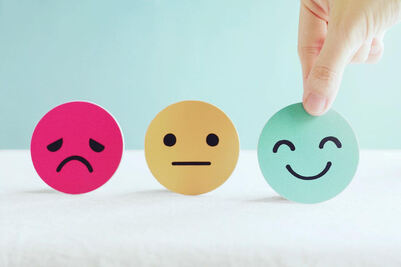
The cornerstones of counselling, irrespective of age
Working in counselling with children and young people can be very different to working with adults, not least because few children and young people step forward themselves to ask for support (the suggestion of counselling and the first contact will generally come from a parent, a teacher or a GP).
But once good introductions have been made and trust is established (and, critically, the child or young person themselves has decided that they’d like to continue), the principals are the same … a safe, confidential place to explore whatever it is that is going on for that person (young or older), through whatever means works best for them, with the aim of achieving a positive outcome.
Empathy, respect, honesty … the three corner stones of counselling, whatever the age.
- 1 November 2021
Working in counselling with children and young people can be very different to working with adults, not least because few children and young people step forward themselves to ask for support (the suggestion of counselling and the first contact will generally come from a parent, a teacher or a GP).
But once good introductions have been made and trust is established (and, critically, the child or young person themselves has decided that they’d like to continue), the principals are the same … a safe, confidential place to explore whatever it is that is going on for that person (young or older), through whatever means works best for them, with the aim of achieving a positive outcome.
Empathy, respect, honesty … the three corner stones of counselling, whatever the age.
- 1 November 2021
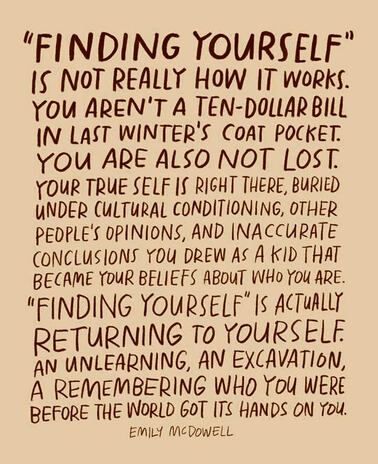
Guiding our own journey
When we first come to counselling, we may wonder if we are about to receive advice, or guidance, or even be told what to do to improve the situation that has brought us to therapy. In fact, what will be offered is something far more profound and useful … the opportunity to reconnect with who we really are, what we really think and how we really feel.
In life, we can lose touch with ourselves as we travel through experiences and relationships. As a result, the real crux of who we are can lay dormant under everything that has passed before.
Uncovering and reconnecting with ourselves is just about the most valuable thing a person can do for themselves, because from that standpoint we can then guide ourselves.
- 24 October 2021
When we first come to counselling, we may wonder if we are about to receive advice, or guidance, or even be told what to do to improve the situation that has brought us to therapy. In fact, what will be offered is something far more profound and useful … the opportunity to reconnect with who we really are, what we really think and how we really feel.
In life, we can lose touch with ourselves as we travel through experiences and relationships. As a result, the real crux of who we are can lay dormant under everything that has passed before.
Uncovering and reconnecting with ourselves is just about the most valuable thing a person can do for themselves, because from that standpoint we can then guide ourselves.
- 24 October 2021
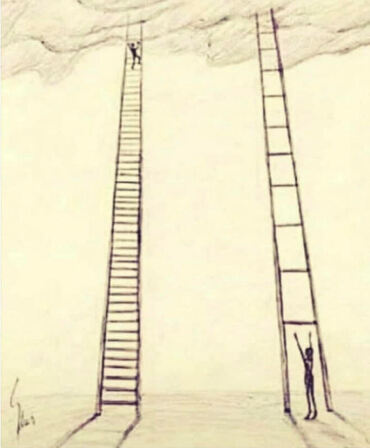
The importance of smaller steps
One of my favourite images . Sometimes it can feel like our steps forward are so small that they feel inconsequential and dispiriting. But they count, these small steps. They mount up, and get us to where we need to be.
A step forward is a step forward.
- 25 September 2021
One of my favourite images . Sometimes it can feel like our steps forward are so small that they feel inconsequential and dispiriting. But they count, these small steps. They mount up, and get us to where we need to be.
A step forward is a step forward.
- 25 September 2021
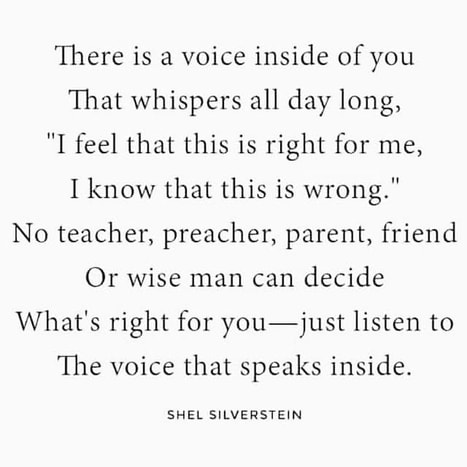
The voice that speaks inside
Never a truer word spoken … we are each our own expert in ourselves. Only we can know what’s right for us (or wrong), and only we can know how to shift ourselves out of something (a situation, a feeling) towards a more positive and authentic outcome.
But sometimes things are cloudy. Sometimes circumstances get in the way of us really being able to listen to ourselves. Sometimes other people have too much power or influence. Sometimes we are in denial. Sometimes we’re just stuck.
Counselling is not about guiding or advising or telling. It’s about really listening. It’s about offering back what’s been heard. It’s a relationship in which space and time, thought, reflection and understanding are shared so that greater clarity might be achieved and a greater ability to
‘just listen to the voice that speaks inside’.
- 19 September 2021
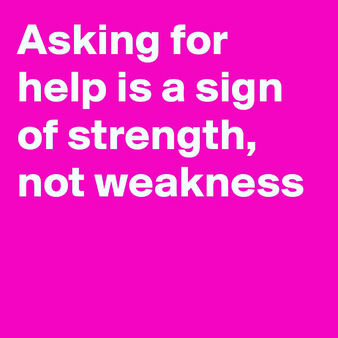
Taking the first step to recovery
Whenever I meet somebody new for the first time in my work, I am always aware of the courage that that first step is likely to have taken (as it did for me when I first met my counsellor many years ago).
New clients are likely to feel apprehensive and nervous, especially if they have not experienced therapy before. What will the counsellor be like? (in my case, particularly un-scary and human, I think). What will they ask me to talk about? (nothing that you don’t want to). Will I be judged?
(nope). Will I feel powerless (no, you’re entirely in the driving seat). When that first leap of faith has been taken, the benefits on the other side can be incalculable.
But I digress. The point is that if you’re not feeling great, talk to someone - anyone. Family member, friend, GP, counsellor, employer. Make that first step.
- 10 September 2021
Whenever I meet somebody new for the first time in my work, I am always aware of the courage that that first step is likely to have taken (as it did for me when I first met my counsellor many years ago).
New clients are likely to feel apprehensive and nervous, especially if they have not experienced therapy before. What will the counsellor be like? (in my case, particularly un-scary and human, I think). What will they ask me to talk about? (nothing that you don’t want to). Will I be judged?
(nope). Will I feel powerless (no, you’re entirely in the driving seat). When that first leap of faith has been taken, the benefits on the other side can be incalculable.
But I digress. The point is that if you’re not feeling great, talk to someone - anyone. Family member, friend, GP, counsellor, employer. Make that first step.
- 10 September 2021
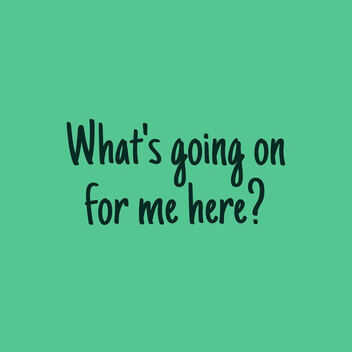
Stop, feel, listen
Often we can be too close to our feelings … they can be overwhelming and suffocating and claustrophobic. Pausing, stepping back, and asking ourselves ‘What’s going on for me here?’ can help. Feelings are important, they’re trying to tell us something. Sometimes we just need to stop and listen.
- 13 August 2021
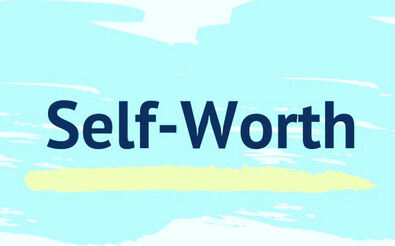
‘The sense of one’s own value or worth as a person’
Three thoughts here …
(1) self-worth is about valuing from the inside, not about relying on external validation from others.
(2) if we take all of our self-worth from just one aspect of our lives (ie physical appearance, or academic or professional achievement, or parenting or whatever) .. we potentially leave ourselves wide open to placing too much pressure on that one area, and ourselves. Far healthier to draw from a variety of pools. (3) if we suspect that self-worth (or lack of) is an issue for us, it’s worth looking at - and challenging - any negative life experiences which may have led to entrenched negative (and wrong) core beliefs that we hold about ourselves …. and the unhelpful rules, assumptions and behaviours that we have adopted to unhelpfully support them, often subconsciously.
- 4 August 2021
Three thoughts here …
(1) self-worth is about valuing from the inside, not about relying on external validation from others.
(2) if we take all of our self-worth from just one aspect of our lives (ie physical appearance, or academic or professional achievement, or parenting or whatever) .. we potentially leave ourselves wide open to placing too much pressure on that one area, and ourselves. Far healthier to draw from a variety of pools. (3) if we suspect that self-worth (or lack of) is an issue for us, it’s worth looking at - and challenging - any negative life experiences which may have led to entrenched negative (and wrong) core beliefs that we hold about ourselves …. and the unhelpful rules, assumptions and behaviours that we have adopted to unhelpfully support them, often subconsciously.
- 4 August 2021

Now working with couples and other relationships
Be they romantic (married or otherwise) or friendships or familial (siblings, parent/adult child) or work based … all relationships have the potential for difficulty, conflict, misunderstanding, assumptions, stuckness, troubled times. Talking helps, because it offers the opportunity for all sides to be heard, and deeper understanding to be achieved and felt. From this standpoint, better decisions are made moving forward.
Pic: Kristina Litvjak
- 11 July 2021
Be they romantic (married or otherwise) or friendships or familial (siblings, parent/adult child) or work based … all relationships have the potential for difficulty, conflict, misunderstanding, assumptions, stuckness, troubled times. Talking helps, because it offers the opportunity for all sides to be heard, and deeper understanding to be achieved and felt. From this standpoint, better decisions are made moving forward.
Pic: Kristina Litvjak
- 11 July 2021

A safe place to explore, at whatever stage of life
In many ways, working with young people in counselling is very different to working with adults, not least because the decision to seek support perhaps hasn’t been theirs initially. But once the relationship has been gently established, once trust and understanding is felt, the process is the same ... a safe place to explore whatever it is that is going on, and in whichever way and at whatever pace works best for that person (young or older).
Pic: Mentatdgt
- 19 June 2021
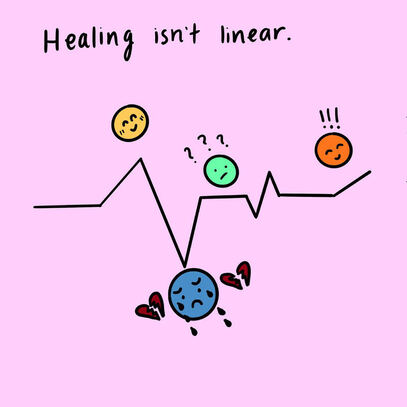
Hold tight, healing isn't lost
Healing isn’t linear. One of the most useful concepts in therapy, most often shared when a client feels that the progress they’ve made has disappeared. Healing is rarely (if ever) linear. Dips, plateaus, curve balls are normal, human, part of recovery. Whats important to know is that the healing that has taken place already is not lost. It is banked away, ready for the upturn.
Illustration: @jenney_sun
- 12 June 2021
Healing isn’t linear. One of the most useful concepts in therapy, most often shared when a client feels that the progress they’ve made has disappeared. Healing is rarely (if ever) linear. Dips, plateaus, curve balls are normal, human, part of recovery. Whats important to know is that the healing that has taken place already is not lost. It is banked away, ready for the upturn.
Illustration: @jenney_sun
- 12 June 2021

Finding the right conditions
We all, us humans, have an inbuilt motivational drive to be the best we can be - whatever that looks like for us individually. But sometimes life can get in the way.
My favourite counselling story: Carl Rogers, the father of humanistic counselling, noticed as a child a sack of potatoes in the basement of his family home which had started to sprout. The seedlings were weak and pale and mis-shapen because the conditions for their growth weren’t good. Little soil, little moisture and limited light from only one tiny external window. But still they grew, despite the conditions they found themselves in. Rogers built his model for therapeutic working from this one childhood experience.
So, what happens if we’ve come from or find ourselves in unfavourable conditions for good mental health and growth?
That’s where counselling comes in. Rogers went on to discover and prove that all that was needed in order for a person in difficulty or distress to experience positive change for themselves were three things within a therapeutic working relationship: empathy, unconditional positive regard (respect) and congruence (genuineness)
With these optimal conditions in place, positive change grows and thrives.
Pic: qinghill
- 18 May 2021
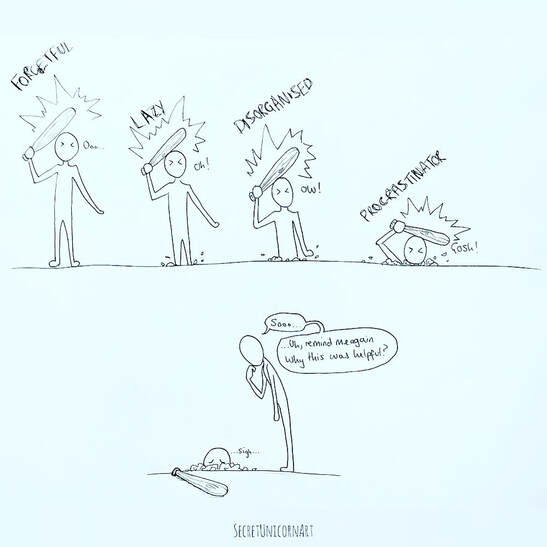
Give yourself a fighting chance, stop beating yourself up
It’s not unusual to find that a client in therapy - who is already dealing with a difficult situation - is also busy beating themselves up at the same time.
This wonderful illustration depicts this phenomenon beautifully I think.
So, if you suspect that you are making life tougher for yourself than need be, in an already tough time, please stop (I know, easier said than done at times) ... or at least be mindful that that’s what might be happening, and perhaps also be aware that this is a little like fighting a battle with your hands tied behind your back. Give yourself a fighting chance.
Illustration: @secretunicornart
- 17 April 2021
It’s not unusual to find that a client in therapy - who is already dealing with a difficult situation - is also busy beating themselves up at the same time.
This wonderful illustration depicts this phenomenon beautifully I think.
So, if you suspect that you are making life tougher for yourself than need be, in an already tough time, please stop (I know, easier said than done at times) ... or at least be mindful that that’s what might be happening, and perhaps also be aware that this is a little like fighting a battle with your hands tied behind your back. Give yourself a fighting chance.
Illustration: @secretunicornart
- 17 April 2021

Beat the bully
Anorexia ... arguably the most disgusting of mental health conditions (and certainly the one responsible for the most deaths), where the sufferer lives constantly with the most abusive of partners in their own mind and body.
Important things to know and remember: (a) it IS an illness, (b) it is not the sufferers fault, and is not deserved, (c) it will start - or rather, sneak in - as a ‘friend’, a support mechanism which apparently offers comfort and control, but there will always come a point where ‘servant becomes master’*. Important to discover the illness’s root, and what ultimately triggered it ... but more so to work out what’s maintaining it. If the drain is being circled, please seek support.
*@healingmindstw
- 12 April 2021
Anorexia ... arguably the most disgusting of mental health conditions (and certainly the one responsible for the most deaths), where the sufferer lives constantly with the most abusive of partners in their own mind and body.
Important things to know and remember: (a) it IS an illness, (b) it is not the sufferers fault, and is not deserved, (c) it will start - or rather, sneak in - as a ‘friend’, a support mechanism which apparently offers comfort and control, but there will always come a point where ‘servant becomes master’*. Important to discover the illness’s root, and what ultimately triggered it ... but more so to work out what’s maintaining it. If the drain is being circled, please seek support.
*@healingmindstw
- 12 April 2021
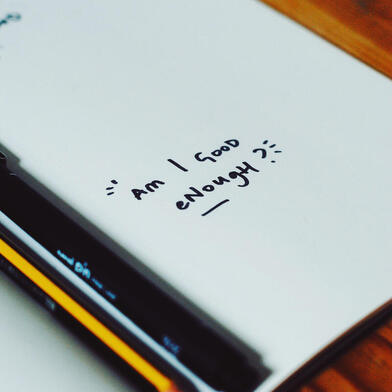
Allow in the freedom and space that comes with [unavoidable and wonderful] imperfection
‘Good enough’ was the term coined by paediatrician and psychoanalyst Donald Winnicott in the ‘50s to describe what he felt was the best kind of mothering ... loving, attentive and consistent but with enough freedom and space to allow children to grow and develop and find their own identities and independence.
I love the term ‘good enough’, not just in relation to parenting but all other life roles too ... partner, spouse, friend, sibling, employee, child. I remember clearly the first time I heard it in training. It sounded wonderful ... the thought that being ‘perfect’ might not (after all) be necessary, and may even (in fact) be detrimental.
The truth is that we don’t have to be perfect ... I’m pretty sure it’s impossible, and whose definition are we working to anyway? But if we’re still left feeling as if we have to be [perfect], that’s where the work is.
- 24 March 2021
‘Good enough’ was the term coined by paediatrician and psychoanalyst Donald Winnicott in the ‘50s to describe what he felt was the best kind of mothering ... loving, attentive and consistent but with enough freedom and space to allow children to grow and develop and find their own identities and independence.
I love the term ‘good enough’, not just in relation to parenting but all other life roles too ... partner, spouse, friend, sibling, employee, child. I remember clearly the first time I heard it in training. It sounded wonderful ... the thought that being ‘perfect’ might not (after all) be necessary, and may even (in fact) be detrimental.
The truth is that we don’t have to be perfect ... I’m pretty sure it’s impossible, and whose definition are we working to anyway? But if we’re still left feeling as if we have to be [perfect], that’s where the work is.
- 24 March 2021
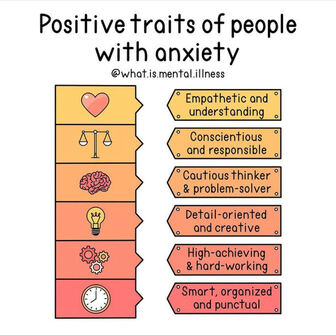
If you can't beat it .... maybe learn to accept it
Anxiety has its uses, just like all other emotions. It’s part of our survival kit, there to alert us if and when something is wrong. But for some of us it can feature pretty much constantly as a not so welcome thread that runs through our lives, moving intermittently (and at times seemingly randomly) between low level, moderate and severe. If this is the case, and if attempts to discover its root have been explored, acceptance (as best we can) can be useful. Fighting against it can make it worse. I love this illustration from @what.is.mental.illness because it shines a light on the fact that, as awful as anxiety can feel at times, it can have positive aspects.
- 24 March 2021
Anxiety has its uses, just like all other emotions. It’s part of our survival kit, there to alert us if and when something is wrong. But for some of us it can feature pretty much constantly as a not so welcome thread that runs through our lives, moving intermittently (and at times seemingly randomly) between low level, moderate and severe. If this is the case, and if attempts to discover its root have been explored, acceptance (as best we can) can be useful. Fighting against it can make it worse. I love this illustration from @what.is.mental.illness because it shines a light on the fact that, as awful as anxiety can feel at times, it can have positive aspects.
- 24 March 2021

Hope is always there ... even if you can't quite see it
A person contemplating suicide doesn’t want to die, they want their pain to end. That person will also, heartbreakingly (and completely wrongly), believe that their loved ones will be better off without them.
If you are that person (and you are not alone), please tell someone that you’re struggling. Help is available. Life will get better. Nothing stays the same. Hope is always there, even if you can’t see it just yet ... a bit like sunshine behind thick cloud.
If you haven’t seen it, please watch #OurSilentEmergency #Asktwice @romankemp @bbcthree
Photo: Thomas Koukas
- 16 March 2021
A person contemplating suicide doesn’t want to die, they want their pain to end. That person will also, heartbreakingly (and completely wrongly), believe that their loved ones will be better off without them.
If you are that person (and you are not alone), please tell someone that you’re struggling. Help is available. Life will get better. Nothing stays the same. Hope is always there, even if you can’t see it just yet ... a bit like sunshine behind thick cloud.
If you haven’t seen it, please watch #OurSilentEmergency #Asktwice @romankemp @bbcthree
Photo: Thomas Koukas
- 16 March 2021
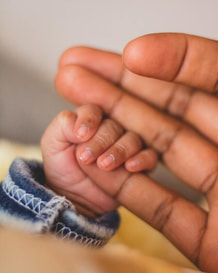
Being aware of what makes you tick
The attachment style that we adopt as a result of our early experiences has a profound affect on how we attach, relate and interact with others throughout our lives. Being aware of our own attachment style (and those of others) - and it’s impact on our thoughts, feelings and behaviours - can often be positively life changing.
- 29 January 2021
The attachment style that we adopt as a result of our early experiences has a profound affect on how we attach, relate and interact with others throughout our lives. Being aware of our own attachment style (and those of others) - and it’s impact on our thoughts, feelings and behaviours - can often be positively life changing.
- 29 January 2021
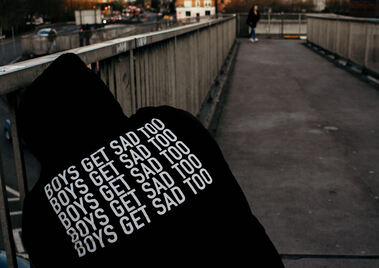
Feeling emotionally rubbish ... a universal thing
We all know that men can struggle with mental health just as much as women (why wouldn’t they? we’re all human and life can be tough) ... So why is it that men are still so much less likely to seek support than women?
My own experience of working with men - young or older - in counselling is this (and please forgive any gross gender-ism, but we only have so many words here): once they give it a try, and trust is built, men really get therapy and use it well, recognising and valuing a private place to talk and explore what’s going on for them. Take the leap ... it might just be worth it.
- 16 January 2021
We all know that men can struggle with mental health just as much as women (why wouldn’t they? we’re all human and life can be tough) ... So why is it that men are still so much less likely to seek support than women?
My own experience of working with men - young or older - in counselling is this (and please forgive any gross gender-ism, but we only have so many words here): once they give it a try, and trust is built, men really get therapy and use it well, recognising and valuing a private place to talk and explore what’s going on for them. Take the leap ... it might just be worth it.
- 16 January 2021
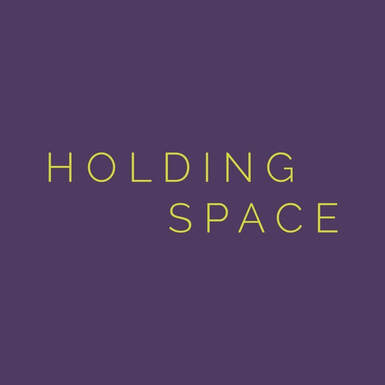
To have [therapy] and to hold
Holding space ... the term used in counselling to describe what it means to be metaphorically ‘held’ by your therapist, not just when together but in between sessions and beyond. For the client, this is one of the most valuable aspects of therapy - knowing that somebody else is mentally and emotionally present with you (as well as physically when together); an empathic support free of judgement, and secure in confidentiality.
- 9 January 2021
Holding space ... the term used in counselling to describe what it means to be metaphorically ‘held’ by your therapist, not just when together but in between sessions and beyond. For the client, this is one of the most valuable aspects of therapy - knowing that somebody else is mentally and emotionally present with you (as well as physically when together); an empathic support free of judgement, and secure in confidentiality.
- 9 January 2021

Stepping forward lightly
Wondering how everybody is feeling about the approaching New Year ... apprehensive, relieved, fearful, hopeful?
Maybe a mixture of all four, or something else entirely?
However you’re feeling about 2021, perhaps an approach or mindset of ‘light attachment’ might be helpful ... in other words, trying to take whatever comes each day at a time, without too much expectation or too little hope.
A balance between the two. And maybe - unless they work particularly well for you - without the heavy burden of resolutions this January ....
- 30 December 2020
(Photo: Simon Migaj)
Wondering how everybody is feeling about the approaching New Year ... apprehensive, relieved, fearful, hopeful?
Maybe a mixture of all four, or something else entirely?
However you’re feeling about 2021, perhaps an approach or mindset of ‘light attachment’ might be helpful ... in other words, trying to take whatever comes each day at a time, without too much expectation or too little hope.
A balance between the two. And maybe - unless they work particularly well for you - without the heavy burden of resolutions this January ....
- 30 December 2020
(Photo: Simon Migaj)

The ‘C’ word ... Christmas
For some, the most wonderful time of the year. For others, dreaded. Its one of the ‘big two’ most talked about seasons in the counselling room (alongside summer); both are loaded with the heavy expectation of what we ‘should’ be doing or feeling (have I mentioned my healthy disdain for the 'should' word?). This year, more than any other, wishing everybody a safe, calm, and peaceful Christmas, free from ‘shoulds’.
- 24 December 2020
For some, the most wonderful time of the year. For others, dreaded. Its one of the ‘big two’ most talked about seasons in the counselling room (alongside summer); both are loaded with the heavy expectation of what we ‘should’ be doing or feeling (have I mentioned my healthy disdain for the 'should' word?). This year, more than any other, wishing everybody a safe, calm, and peaceful Christmas, free from ‘shoulds’.
- 24 December 2020
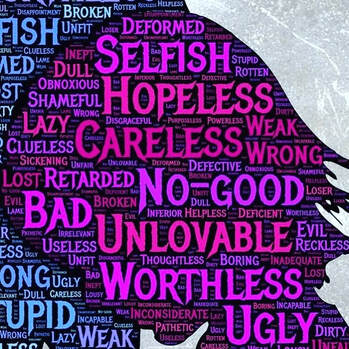
'If you wouldn't say it to a friend, don't say it to yourself'
The way some of us speak to ourselves internally is nothing short of scandalous. If we heard someone talking out loud to another human being like this we’d step in.
These internal dialogues (which brings to mind the term once coined by Nigella Lawson: ‘intimate terrorism’) can become very ingrained, and profoundly damaging. The good news is that this type of behaviour can be stopped. But it takes awareness that it is happening, a concerted effort and practice .... and most important of all a decisive decision to stop sabotaging self.
(* Title quote: Jane Travis)
- 9 December 2020
The way some of us speak to ourselves internally is nothing short of scandalous. If we heard someone talking out loud to another human being like this we’d step in.
These internal dialogues (which brings to mind the term once coined by Nigella Lawson: ‘intimate terrorism’) can become very ingrained, and profoundly damaging. The good news is that this type of behaviour can be stopped. But it takes awareness that it is happening, a concerted effort and practice .... and most important of all a decisive decision to stop sabotaging self.
(* Title quote: Jane Travis)
- 9 December 2020
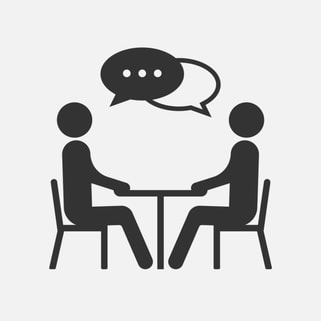
Straight talking
Good, clear, open hearted communication is profoundly important in life ... that, and not assuming we know what the other person is thinking or feeling or, for that matter, minding how the other person will respond to our own very real thoughts and feelings. It’s about being in touch with who we are, and being as inline with that in our daily lives and interactions as possible - simply and calmly, adult to adult. Then we all know where we stand .... and that’s the good stuff to work with.
- 29 November 2020
Good, clear, open hearted communication is profoundly important in life ... that, and not assuming we know what the other person is thinking or feeling or, for that matter, minding how the other person will respond to our own very real thoughts and feelings. It’s about being in touch with who we are, and being as inline with that in our daily lives and interactions as possible - simply and calmly, adult to adult. Then we all know where we stand .... and that’s the good stuff to work with.
- 29 November 2020

Ever decreasing circles
Do you ever feel like you’re going round in circles? Within your own thoughts, relationships, circumstance or behaviours? Coming to counselling is about seeking change, from whatever it is that is causing distress, disharmony or discomfort.
Clarity is key, as too is increased self-awareness.
And sometimes, after all of that, a leap of faith ... (where the run up can often feel worse than the leap) in order to exit the circle to freedom.
- 14 November 2020
Do you ever feel like you’re going round in circles? Within your own thoughts, relationships, circumstance or behaviours? Coming to counselling is about seeking change, from whatever it is that is causing distress, disharmony or discomfort.
Clarity is key, as too is increased self-awareness.
And sometimes, after all of that, a leap of faith ... (where the run up can often feel worse than the leap) in order to exit the circle to freedom.
- 14 November 2020
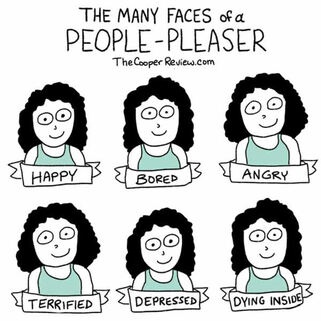
Please yourself (as well as others)
‘People pleasing’ isn’t about being kind, helpful, thoughtful ... it’s about feeling that the needs, cares and thoughts of someone else are more important then our own. If this is the case it’s a good idea to explore levels of self-worth, or the relational ‘conditions’ that have been placed on us by others. Sitting back and asking ourselves ‘what’s that all about? can be useful. There’s nothing wrong in wanting to please, but having to please is a whole different ballgame.
- 7 November 2020
‘People pleasing’ isn’t about being kind, helpful, thoughtful ... it’s about feeling that the needs, cares and thoughts of someone else are more important then our own. If this is the case it’s a good idea to explore levels of self-worth, or the relational ‘conditions’ that have been placed on us by others. Sitting back and asking ourselves ‘what’s that all about? can be useful. There’s nothing wrong in wanting to please, but having to please is a whole different ballgame.
- 7 November 2020
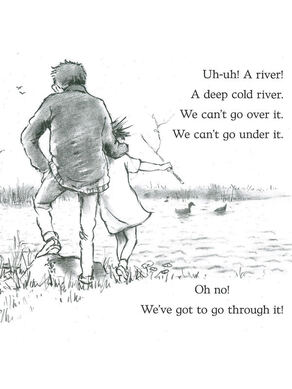
- We've got to go through it
Grief is a bit like the bear hunt .... there’s no way around it, we have to go through it. But how that journey turns out might not be what we expect. There are many models that attempt to explain how people experience and move through grief. Arguably the best known is Elizabeth Kubler-Ross’s process with its 5 (sometimes 7) stages of grief: Denial, Anger, Bargaining, Depression, Acceptance. Important to remember (as Elizabeth herself pointed out) that we don’t necessarily work through these stages sequentially in an orderly fashion; sometimes we skip a stage, some times we don’t experience one of them at all, sometimes we reverse, and sometimes we get stuck. Helpful to know perhaps that healing isn’t always linear and all reactions and feelings are ‘normal’. Whatever the journey, talking helps the processing of this most difficult of human experiences.
- 24 October 2020
Grief is a bit like the bear hunt .... there’s no way around it, we have to go through it. But how that journey turns out might not be what we expect. There are many models that attempt to explain how people experience and move through grief. Arguably the best known is Elizabeth Kubler-Ross’s process with its 5 (sometimes 7) stages of grief: Denial, Anger, Bargaining, Depression, Acceptance. Important to remember (as Elizabeth herself pointed out) that we don’t necessarily work through these stages sequentially in an orderly fashion; sometimes we skip a stage, some times we don’t experience one of them at all, sometimes we reverse, and sometimes we get stuck. Helpful to know perhaps that healing isn’t always linear and all reactions and feelings are ‘normal’. Whatever the journey, talking helps the processing of this most difficult of human experiences.
- 24 October 2020
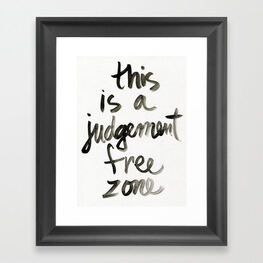
No room for judgement
There are times when a client might worry that they are letting their therapist down. This will typically be when someone is wrangling with an inner conflict about how to move forward in their lives, and they fear judgement from the person with whom they have shared private experiences and inner most thoughts. Important to say that judgement has no place in the therapy room. At all. A therapist may quietly wish good things for their client (therapeutic relationships are as real as any other) but will have no view as to what that outcome is. Only the client themselves will know what’s right for them (just as only I can know what’s right for me). What counselling offers is the space and relationship in which a client can explore whatever it is that is going on for them, so they can move from stuckness towards personal resolution, whatever that looks like.
*image Jessica Stock ️
- 15 October 2020
There are times when a client might worry that they are letting their therapist down. This will typically be when someone is wrangling with an inner conflict about how to move forward in their lives, and they fear judgement from the person with whom they have shared private experiences and inner most thoughts. Important to say that judgement has no place in the therapy room. At all. A therapist may quietly wish good things for their client (therapeutic relationships are as real as any other) but will have no view as to what that outcome is. Only the client themselves will know what’s right for them (just as only I can know what’s right for me). What counselling offers is the space and relationship in which a client can explore whatever it is that is going on for them, so they can move from stuckness towards personal resolution, whatever that looks like.
*image Jessica Stock ️
- 15 October 2020

To hear is not necessarily to obey
Gremlins, aka the Poisoned Parrot, aka that little internal voice that hisses and scoffs ‘who do you think you are?’ ‘what makes you think that you are good enough?’ ‘you are not deserving’, ‘give it up!’ (and quite frankly, these are the cleaner, kinder versions). However the Gremlin came to be, its worth knowing two things: (1) he’s worth challenging, and (2) he doesn’t have to be obeyed.
*Carolyn Spring, Reversing Adversity
- 4 October 2020
Gremlins, aka the Poisoned Parrot, aka that little internal voice that hisses and scoffs ‘who do you think you are?’ ‘what makes you think that you are good enough?’ ‘you are not deserving’, ‘give it up!’ (and quite frankly, these are the cleaner, kinder versions). However the Gremlin came to be, its worth knowing two things: (1) he’s worth challenging, and (2) he doesn’t have to be obeyed.
*Carolyn Spring, Reversing Adversity
- 4 October 2020
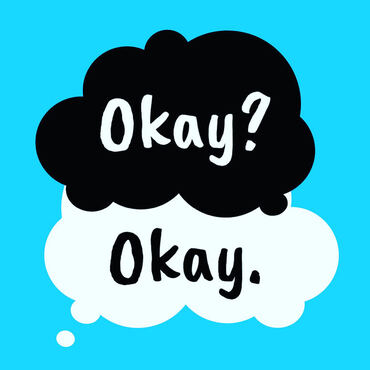
Am I okay with this?
The simplest of questions. When something is bothering us, just asking ourselves ‘Am I okay with this?’ is a very useful way of shaking the stuckness a little. If the answer is: ‘Yes, on balance it’s fine’ - then okay, we’ve explored it, time to encourage ourselves to move on. If the answer is: ‘No, I’m still not okay with this’, the next step is to work out whether there is anything we can do about it. There may be nothing within our power that can be done, or there may be options available to us. The final question to ask ourself is whether we’re actually prepared to do something? Working through this three-tiered framework encourages a little separateness from the problem, greater clarity and a boost to feelings of control and self-empowerment.
- 19 September 2020
The simplest of questions. When something is bothering us, just asking ourselves ‘Am I okay with this?’ is a very useful way of shaking the stuckness a little. If the answer is: ‘Yes, on balance it’s fine’ - then okay, we’ve explored it, time to encourage ourselves to move on. If the answer is: ‘No, I’m still not okay with this’, the next step is to work out whether there is anything we can do about it. There may be nothing within our power that can be done, or there may be options available to us. The final question to ask ourself is whether we’re actually prepared to do something? Working through this three-tiered framework encourages a little separateness from the problem, greater clarity and a boost to feelings of control and self-empowerment.
- 19 September 2020
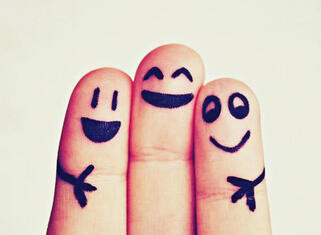
Finding possible obstructors to 'happiness'
The holy trinity: in no particular order, the three components* that underpin human happiness - (1) meaningful relationships, (2) purpose, (3) physical activity. All three aspects are as important as each other, and worth looking at perhaps if we’re going through a period of low mood and aren’t sure why ..... to see if something is amiss or whether there’s anything out of balance. p.s. just a thought: us humans aren’t meant to be ‘happy’ 24/7; feel free to replace the word ‘happiness’ in the first sentence above with whatever word you’d choose to describe the emotional state you crave most (contentment, at peace, grounded .....), whatever resonates with you.
*University of Liverpool Psychology Professor Peter Kinderman.
- 9 September 2020
The holy trinity: in no particular order, the three components* that underpin human happiness - (1) meaningful relationships, (2) purpose, (3) physical activity. All three aspects are as important as each other, and worth looking at perhaps if we’re going through a period of low mood and aren’t sure why ..... to see if something is amiss or whether there’s anything out of balance. p.s. just a thought: us humans aren’t meant to be ‘happy’ 24/7; feel free to replace the word ‘happiness’ in the first sentence above with whatever word you’d choose to describe the emotional state you crave most (contentment, at peace, grounded .....), whatever resonates with you.
*University of Liverpool Psychology Professor Peter Kinderman.
- 9 September 2020
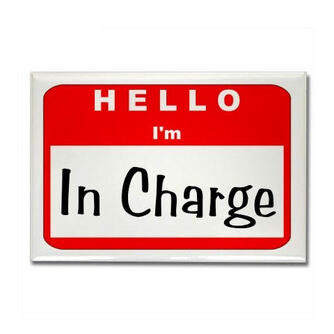
Being in charge of our emotions, not them over us
Nobody has the power to make us feel anything. Nobody can make us feel ashamed, hurt, angry, sad, upset. It is us who has control over whether we feel something. Full disclosure: this was a tough one for me to get my head around originally. (And just to be clear, I’m not talking about any form of abuse here); how is it possible not to respond automatically with feelings of hurt, anger, shame when someone behaves badly towards us, i.e. within a friendship or a personal relationship or a work situation? And yet it is true. We have a choice. The key is in looking closely at the situation as impartially as we can, and working out what’s really going on for us and why. Is the feeling really deserved? Where is our response to what’s happening coming from? What previous experiences have been triggered? What is the motive behind the action that affected us in the first place? Is it, in fact, ‘their stuff’, and not ours? How much responsibility do we actually need to take? Once we understand ourselves a little better (and where we stand in any given situation), then we have a much better chance of being in control of our emotions - and not them over us.
- 3 September 2020
Nobody has the power to make us feel anything. Nobody can make us feel ashamed, hurt, angry, sad, upset. It is us who has control over whether we feel something. Full disclosure: this was a tough one for me to get my head around originally. (And just to be clear, I’m not talking about any form of abuse here); how is it possible not to respond automatically with feelings of hurt, anger, shame when someone behaves badly towards us, i.e. within a friendship or a personal relationship or a work situation? And yet it is true. We have a choice. The key is in looking closely at the situation as impartially as we can, and working out what’s really going on for us and why. Is the feeling really deserved? Where is our response to what’s happening coming from? What previous experiences have been triggered? What is the motive behind the action that affected us in the first place? Is it, in fact, ‘their stuff’, and not ours? How much responsibility do we actually need to take? Once we understand ourselves a little better (and where we stand in any given situation), then we have a much better chance of being in control of our emotions - and not them over us.
- 3 September 2020
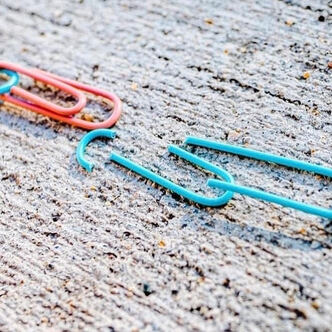
Finding freedom from unhelpful cycles of behaviour
Unpicking how it is that we get ourselves into unhelpful and repetitive patterns of behaviour can be a very effective way of finding a better way forward for ourselves. It’s about working out what the original trigger thought was, then identifying the feeling that came with it, and finally the behaviour that came as a result after that (i.e. what we did next): in short, Thought > Feeling > Behaviour. Another way of looking at it is ABC: (A) Activating event > (B) Belief > (C) Consequence*. It’s a framework that can be applied to so many situations. For instance, thinking that we have been left out of something socially, leading to > feelings of hurt, anger or upset, leading to > rash responses and/or diminished feelings of self-worth. In other words, how we can be complicit in making ourselves feel pretty awful. Break the chain ... look at the situation from a distance .... identify old patterns of Thought > Feeling > Behaviour ... challenge them ... find freedom from any cycle of behaviour that doesn’t serve you well.
*Cognitive Behavioural Therapy (CBT).
- 28 August 2020
Unpicking how it is that we get ourselves into unhelpful and repetitive patterns of behaviour can be a very effective way of finding a better way forward for ourselves. It’s about working out what the original trigger thought was, then identifying the feeling that came with it, and finally the behaviour that came as a result after that (i.e. what we did next): in short, Thought > Feeling > Behaviour. Another way of looking at it is ABC: (A) Activating event > (B) Belief > (C) Consequence*. It’s a framework that can be applied to so many situations. For instance, thinking that we have been left out of something socially, leading to > feelings of hurt, anger or upset, leading to > rash responses and/or diminished feelings of self-worth. In other words, how we can be complicit in making ourselves feel pretty awful. Break the chain ... look at the situation from a distance .... identify old patterns of Thought > Feeling > Behaviour ... challenge them ... find freedom from any cycle of behaviour that doesn’t serve you well.
*Cognitive Behavioural Therapy (CBT).
- 28 August 2020

Point break
Everybody has a breaking point. Nobody is invincible. All it takes is a perfect storm of circumstances, timing and predisposing personal factors.
Feeling low or anxious is not a sign of weakness. It’s a sign of being human and responding to what’s happening for us, or even just sensing that something isn’t quite right. Seeking support, talking, knowing that there’s hope, wanting recovery.... that’s a sign of strength.
- 2 August 2020
Everybody has a breaking point. Nobody is invincible. All it takes is a perfect storm of circumstances, timing and predisposing personal factors.
Feeling low or anxious is not a sign of weakness. It’s a sign of being human and responding to what’s happening for us, or even just sensing that something isn’t quite right. Seeking support, talking, knowing that there’s hope, wanting recovery.... that’s a sign of strength.
- 2 August 2020
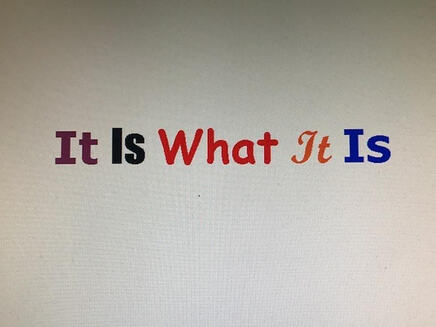
Acceptance is everything ....
... by which I mean the point at which we accept the situation we are in for what it is, and the person we are for who we are ..... free from denial, bargaining, ‘what if’s and ‘if only’s.What it doesn’t mean is rolling over with our legs in the air and accepting any old thing that is thrown at us. Rather that acceptance is full awareness of what is going on (and perhaps why), and where we sit within it.
From this view point we have a much better chance of finding for ourselves a more honest and positive way forward.
- 24 July 2020
... by which I mean the point at which we accept the situation we are in for what it is, and the person we are for who we are ..... free from denial, bargaining, ‘what if’s and ‘if only’s.What it doesn’t mean is rolling over with our legs in the air and accepting any old thing that is thrown at us. Rather that acceptance is full awareness of what is going on (and perhaps why), and where we sit within it.
From this view point we have a much better chance of finding for ourselves a more honest and positive way forward.
- 24 July 2020
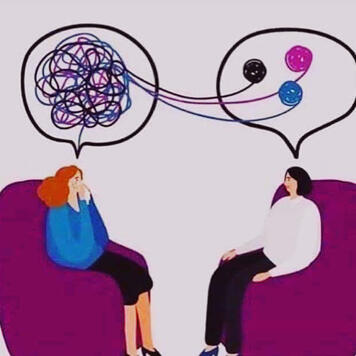
Unravel - in a good way
An oldie but goodie, this illustration. It’s not uncommon for a new client during their first few sessions to say something like ‘I don’t know where to start’, or ‘this all feels like such a mess’, because this is how it can feel as we start to tell our story and describe what it is that has brought us to counselling. This is the illustration that I’ll use most often to help describe how counselling works (or sometimes I find myself using the analogy of a big pile of spaghetti - although, thinking about it, perhaps it’s not quite as attractive as the wool ).
In other words, it might feel as if not much makes sense right now, or that it all feels too enormous and indescribable, but that’s because we’re at the start; you haven’t had chance to get it all out yet, or set the context, or to have a good sort through, and begin to put everything into separate piles that will later make more sense for you. A good counsellor (to my mind) won’t tell you what those piles should be or which strands should go where, but they will listen intently and help you clarify your own thinking and your own decisions moving forward. That’s what it’s all about.
- 16 July 2020
An oldie but goodie, this illustration. It’s not uncommon for a new client during their first few sessions to say something like ‘I don’t know where to start’, or ‘this all feels like such a mess’, because this is how it can feel as we start to tell our story and describe what it is that has brought us to counselling. This is the illustration that I’ll use most often to help describe how counselling works (or sometimes I find myself using the analogy of a big pile of spaghetti - although, thinking about it, perhaps it’s not quite as attractive as the wool ).
In other words, it might feel as if not much makes sense right now, or that it all feels too enormous and indescribable, but that’s because we’re at the start; you haven’t had chance to get it all out yet, or set the context, or to have a good sort through, and begin to put everything into separate piles that will later make more sense for you. A good counsellor (to my mind) won’t tell you what those piles should be or which strands should go where, but they will listen intently and help you clarify your own thinking and your own decisions moving forward. That’s what it’s all about.
- 16 July 2020
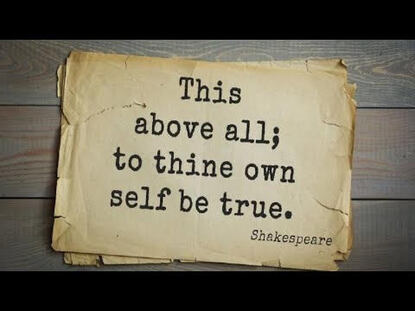
'Happiness is when what you think, what you say and what you do are in harmony' - Mahatma Gandhi
‘Congruence’ is a big word in counselling. It means more than just honesty, or genuineness ... to me, it means knowing who we are, in our heart of hearts, and living as closely to that in our daily lives and interactions as possible; no drama, just quietly, personally congruent.
Living incongruently - that is to deny or suppress our true thoughts, feelings and the essence of who we are - leads inevitably to distress and unhappiness. Sounds obvious, right? And yet it can be such an easy state to slip into.
Getting back in touch with who we really are - especially if we’ve been layered down by the opinions and the demands of others over the years - can take some work, but it’s invariably worth it. Living congruently, that’s where ‘the good life’* is.
(*Carl Rogers, founder of Person Centred Therapy)
- 4 July 2020
‘Congruence’ is a big word in counselling. It means more than just honesty, or genuineness ... to me, it means knowing who we are, in our heart of hearts, and living as closely to that in our daily lives and interactions as possible; no drama, just quietly, personally congruent.
Living incongruently - that is to deny or suppress our true thoughts, feelings and the essence of who we are - leads inevitably to distress and unhappiness. Sounds obvious, right? And yet it can be such an easy state to slip into.
Getting back in touch with who we really are - especially if we’ve been layered down by the opinions and the demands of others over the years - can take some work, but it’s invariably worth it. Living congruently, that’s where ‘the good life’* is.
(*Carl Rogers, founder of Person Centred Therapy)
- 4 July 2020
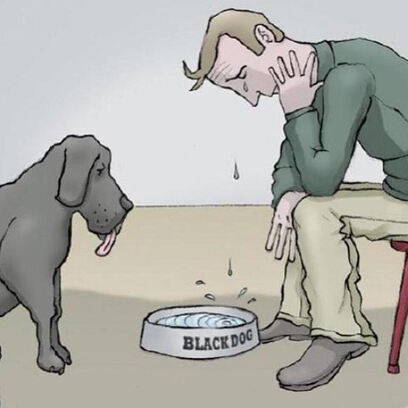
What does yours look like?
It seems to me that everybody who suffers from depression* describes theirs differently - and yet we all know what it is. I find this both fascinating and humanly comforting.
It can be really useful to picture (or paint, or draw) what depression looks and feels like to that person; part of that work might be to get to grips with that particular depression’s personality, or to visualise it’s colour, what it sounds like, or even it’s smell. Give it a name - the more details the better.
Doing this helps to separate ‘it’ (the depression) from the person, when ‘it’ is busy telling the sufferer that ‘it’ is actually the person themselves (it’s not - insidious beast that it is).
Matthew Johnstone’s brilliant books about depression uses the ‘Black Dog’ analogy made famous by Winston Churchill, whilst in @bryonygordon’s fantastic book ‘Eat, Drink, Run’, some of her Mental Health Mates describe theirs as: ‘a black snake [finding] the worst case intention behind everyone and everything’, ‘a sly and nasty hyena, because it always laughs at you and tells you how stupid you are’, ‘a slug .... hard to get rid of, not nice to look at, has a slimy but potent hold over me and leaves a trail of destruction in its wake’.
Depression doesn’t have to look like an animal. It could be a pit, or a cave, or a cloak, or a weight - whatever fits best for the person living with it.
Whatever it looks like, visualising and personifying it can help wrestle some power back .... which combined with other support mechanisms can really help in the fight back to good mental health.
*depression can happen to anyone.
- 27 June 2020
It seems to me that everybody who suffers from depression* describes theirs differently - and yet we all know what it is. I find this both fascinating and humanly comforting.
It can be really useful to picture (or paint, or draw) what depression looks and feels like to that person; part of that work might be to get to grips with that particular depression’s personality, or to visualise it’s colour, what it sounds like, or even it’s smell. Give it a name - the more details the better.
Doing this helps to separate ‘it’ (the depression) from the person, when ‘it’ is busy telling the sufferer that ‘it’ is actually the person themselves (it’s not - insidious beast that it is).
Matthew Johnstone’s brilliant books about depression uses the ‘Black Dog’ analogy made famous by Winston Churchill, whilst in @bryonygordon’s fantastic book ‘Eat, Drink, Run’, some of her Mental Health Mates describe theirs as: ‘a black snake [finding] the worst case intention behind everyone and everything’, ‘a sly and nasty hyena, because it always laughs at you and tells you how stupid you are’, ‘a slug .... hard to get rid of, not nice to look at, has a slimy but potent hold over me and leaves a trail of destruction in its wake’.
Depression doesn’t have to look like an animal. It could be a pit, or a cave, or a cloak, or a weight - whatever fits best for the person living with it.
Whatever it looks like, visualising and personifying it can help wrestle some power back .... which combined with other support mechanisms can really help in the fight back to good mental health.
*depression can happen to anyone.
- 27 June 2020
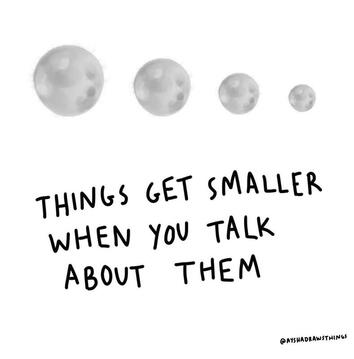
Taking a leap of faith
There are few things more wonderful, or more humanly connecting, than witnessing a client’s visible relief and lightening as they realise that the world hasn’t gone up in smoke now that they’ve found the space and courage to talk about whatever it is that they’ve been harbouring and carrying, sometimes for years.
In a heartbeat, something that has been deeply unsettling or disturbing or shame making - an event, a memory, a thought or a feeling - somehow no longer holds the same power now that it has been said out loud and found the light of day.
And then we can settle down to look at what it’s actually all about, before finding a way forward ️.
** just as wonderful to be on the other side of the couch too.
- 21 June 2020
There are few things more wonderful, or more humanly connecting, than witnessing a client’s visible relief and lightening as they realise that the world hasn’t gone up in smoke now that they’ve found the space and courage to talk about whatever it is that they’ve been harbouring and carrying, sometimes for years.
In a heartbeat, something that has been deeply unsettling or disturbing or shame making - an event, a memory, a thought or a feeling - somehow no longer holds the same power now that it has been said out loud and found the light of day.
And then we can settle down to look at what it’s actually all about, before finding a way forward ️.
** just as wonderful to be on the other side of the couch too.
- 21 June 2020

A weighty issue
Weight is a deeply complicated issue for many of us. It impacts greatly on how we feel about and relate to ourselves, others and the world in general.
Over two thirds of people in this country have an unhealthy relationship with their ‘food, weight and shape’. That’s a staggering amount of people - both women and men - who spend a phenomenal amount of time wrangling daily with their disordered eating (under eating, over eating and a hundred variants in between - whether ‘mild’ or severe).
At the risk of sounding blindingly obvious, consistently thinking negatively about our bodies - and therefore being persistently unkind to ourselves - cannot help but have a detrimental affect on our mental wellbeing.
I was fortunate enough to attend and participate in professional training in working with eating disorders and obesity at the beginning of the year (delivered by the brilliant @healingmindstw).
Two things particularly have stayed with me from the many, many things that I learnt. The first is the ‘3 P’s’, the three factors that have led and fed (no pun intended) an experience of disordered eating: (1) Predisposing factors: what laid the foundations? (2) Precipitating factors - what started it? (3) Perpetuating factors: what keeps it going?
And the second is this: at the beginning, a person will very much have been the master of their eating habit, but there will always come a time when master becomes servant.
- 14 June 2020
Weight is a deeply complicated issue for many of us. It impacts greatly on how we feel about and relate to ourselves, others and the world in general.
Over two thirds of people in this country have an unhealthy relationship with their ‘food, weight and shape’. That’s a staggering amount of people - both women and men - who spend a phenomenal amount of time wrangling daily with their disordered eating (under eating, over eating and a hundred variants in between - whether ‘mild’ or severe).
At the risk of sounding blindingly obvious, consistently thinking negatively about our bodies - and therefore being persistently unkind to ourselves - cannot help but have a detrimental affect on our mental wellbeing.
I was fortunate enough to attend and participate in professional training in working with eating disorders and obesity at the beginning of the year (delivered by the brilliant @healingmindstw).
Two things particularly have stayed with me from the many, many things that I learnt. The first is the ‘3 P’s’, the three factors that have led and fed (no pun intended) an experience of disordered eating: (1) Predisposing factors: what laid the foundations? (2) Precipitating factors - what started it? (3) Perpetuating factors: what keeps it going?
And the second is this: at the beginning, a person will very much have been the master of their eating habit, but there will always come a time when master becomes servant.
- 14 June 2020
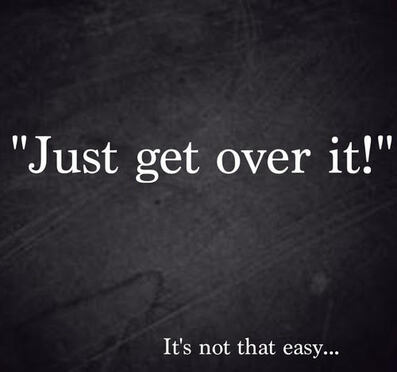
Learning to live well again
We don’t ‘get over’ trauma and loss* - that’s what has become clear to me whilst working with people experiencing grief. Sad to say that there isn’t a magic eraser out there that can eradicate all memory and feeling of what we have lost and what we’ve been through.
There also isn’t - and this is important - a specified time by which you have to feel ‘better’ (especially if said time frame is implied by others, i.e. ‘shouldn’t you be over this by now?’; answer: ‘if I’m not feeling it, apparently not’).
Life after loss is undoubtedly different. But what I have also learnt is that we can - with time, with processing, with self-compassion and a little faith - learn to live well again with it.
*when we think of loss and grief we think, of course, of bereavement, but these words also to apply to all kinds of endings ...... marriage/partnerships, friendship, work, self-esteem, a way of life ...)
- 7 June 2020
We don’t ‘get over’ trauma and loss* - that’s what has become clear to me whilst working with people experiencing grief. Sad to say that there isn’t a magic eraser out there that can eradicate all memory and feeling of what we have lost and what we’ve been through.
There also isn’t - and this is important - a specified time by which you have to feel ‘better’ (especially if said time frame is implied by others, i.e. ‘shouldn’t you be over this by now?’; answer: ‘if I’m not feeling it, apparently not’).
Life after loss is undoubtedly different. But what I have also learnt is that we can - with time, with processing, with self-compassion and a little faith - learn to live well again with it.
*when we think of loss and grief we think, of course, of bereavement, but these words also to apply to all kinds of endings ...... marriage/partnerships, friendship, work, self-esteem, a way of life ...)
- 7 June 2020
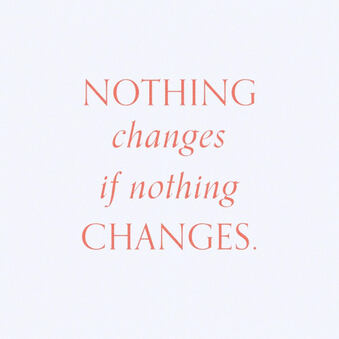
The common thread that binds
The presenting issues that clients bring to counselling are many and varied, but there is one common thread that binds us all together - the need for change. Everybody who comes to therapy wants something to change, be that how we are feeling, or the situation or circumstance that we find ourselves in.
Working towards any kind of change can be scary. It can take time, exploration, wrangling ... and most of all, a reconnection (if we have become disconnected) to who we really are.
Change needn’t be a giant leap, sometimes just a little shift in mindset is all that is needed to bring about a positive outcome ️.
- 31 May 2020
The presenting issues that clients bring to counselling are many and varied, but there is one common thread that binds us all together - the need for change. Everybody who comes to therapy wants something to change, be that how we are feeling, or the situation or circumstance that we find ourselves in.
Working towards any kind of change can be scary. It can take time, exploration, wrangling ... and most of all, a reconnection (if we have become disconnected) to who we really are.
Change needn’t be a giant leap, sometimes just a little shift in mindset is all that is needed to bring about a positive outcome ️.
- 31 May 2020
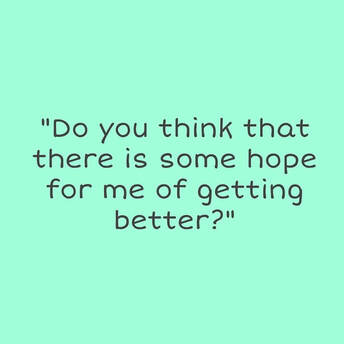
The commitment of both client and therapist
One of my favourite therapy related books whilst training, and still one that I love today is Robert de Board’s ‘Counselling for Toads’. It beautifully and simply describes how a particular type of counselling works using the story of ‘The Wind in the Willows’. Toad has become clinically depressed and his friends are very worried about him, which leads him to counselling with the Heron. During their first session, Toad asks whether he will ever feel better again.
Heron’s reply (posted below) remains, for me, one of the best, most honest, most tender explanations of what to expect from counselling and the commitment needed from both client and therapist.
- 25 May 2020
One of my favourite therapy related books whilst training, and still one that I love today is Robert de Board’s ‘Counselling for Toads’. It beautifully and simply describes how a particular type of counselling works using the story of ‘The Wind in the Willows’. Toad has become clinically depressed and his friends are very worried about him, which leads him to counselling with the Heron. During their first session, Toad asks whether he will ever feel better again.
Heron’s reply (posted below) remains, for me, one of the best, most honest, most tender explanations of what to expect from counselling and the commitment needed from both client and therapist.
- 25 May 2020

The need for personal boundaries
Boundaries ..... or more specifically the need for them. This comes up a lot in counselling, as people become increasingly self-aware and realise the necessity of knowing where their limits are; what they are and aren’t comfortable with, and the personal damage that can be done if we constantly allow others to cross a line that we haven’t defined. In my mind’s eye I see personal boundaries not so much as the Berlin Wall but rather a little picket fence: no drama, no big announcements, just a gentle knowledge of where our boundaries are and the ability to explain and gently reinforce them when others attempt to step over.
And then everybody knows where we stand.
- 21 May 2020
Boundaries ..... or more specifically the need for them. This comes up a lot in counselling, as people become increasingly self-aware and realise the necessity of knowing where their limits are; what they are and aren’t comfortable with, and the personal damage that can be done if we constantly allow others to cross a line that we haven’t defined. In my mind’s eye I see personal boundaries not so much as the Berlin Wall but rather a little picket fence: no drama, no big announcements, just a gentle knowledge of where our boundaries are and the ability to explain and gently reinforce them when others attempt to step over.
And then everybody knows where we stand.
- 21 May 2020
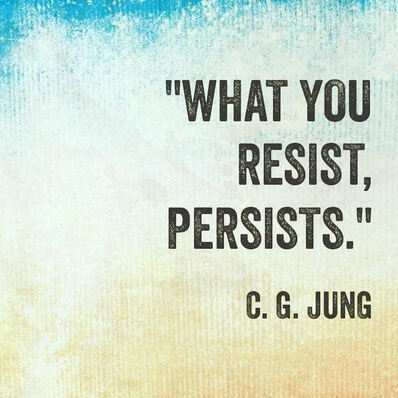
Going against the grain
Here’s the thing. All feelings serve a purpose, no matter how awful or wonderful or uncomfortable. Our human tendency (understandably) is to deny, suppress or fight against the emotions we think of as unattractive or ‘bad’; feelings such as sadness, disappointment or anger. What this does though is keep these lesser wanted feelings with us for longer ... or worse still mutate into depression.
If we can try to learn to acknowledge and accept what we are feeling for what it is, and let it do its thing, it’s likely to flow through us all the faster and help us process what we’re experiencing more productively. It’s a bit like ‘We’re Going on a Bear Hunt’ ... sometimes we just have to go through it, no matter how tough, so we can save ourselves from stuckness and get to the other side.
*illustration quote given to me recently by my wonderful supervisor ; I hadn’t heard it before but it’s perfect.
- 17 May 2020
Here’s the thing. All feelings serve a purpose, no matter how awful or wonderful or uncomfortable. Our human tendency (understandably) is to deny, suppress or fight against the emotions we think of as unattractive or ‘bad’; feelings such as sadness, disappointment or anger. What this does though is keep these lesser wanted feelings with us for longer ... or worse still mutate into depression.
If we can try to learn to acknowledge and accept what we are feeling for what it is, and let it do its thing, it’s likely to flow through us all the faster and help us process what we’re experiencing more productively. It’s a bit like ‘We’re Going on a Bear Hunt’ ... sometimes we just have to go through it, no matter how tough, so we can save ourselves from stuckness and get to the other side.
*illustration quote given to me recently by my wonderful supervisor ; I hadn’t heard it before but it’s perfect.
- 17 May 2020
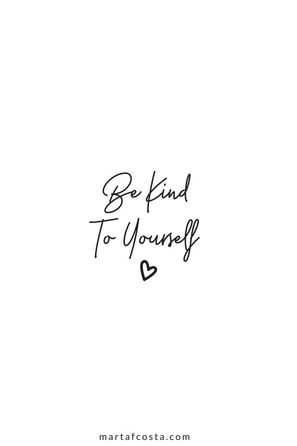
Making obstacles smaller with self compassion
Sound corny? And yet it cannot be underestimated how important it is to try and treat ourselves kindly when we’re going through difficult times in our lives - whether that’s to do with the current Coronavirus situation, divorce, grief, work or family worries, or whatever else we’re currently working through.
What is it about the human condition that thinks it’s a good idea to give ourselves a hard time when we’re already feeling pretty rubbish? It’s as simple as this equation: difficult time + beating ourselves up for being in said difficult time (or just for being ourselves) = huge additional obstacle to recovery and healing.
Let’s just concentrate on the difficult time bit. That’s enough.
- 13 May 2020
Sound corny? And yet it cannot be underestimated how important it is to try and treat ourselves kindly when we’re going through difficult times in our lives - whether that’s to do with the current Coronavirus situation, divorce, grief, work or family worries, or whatever else we’re currently working through.
What is it about the human condition that thinks it’s a good idea to give ourselves a hard time when we’re already feeling pretty rubbish? It’s as simple as this equation: difficult time + beating ourselves up for being in said difficult time (or just for being ourselves) = huge additional obstacle to recovery and healing.
Let’s just concentrate on the difficult time bit. That’s enough.
- 13 May 2020
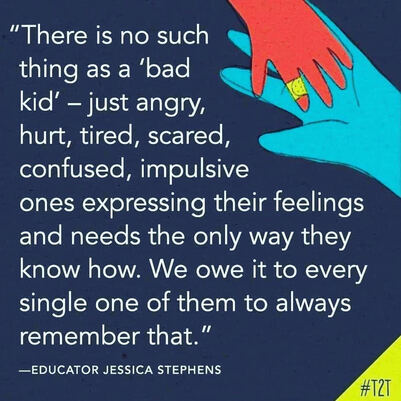
There's no such thing as a 'bad kid'
I had the great pleasure of working closely with young children for over ten years before I became a counsellor. I absolutely loved my job and each and every child I taught. No matter how tough an average teaching day was (did I just say average day?!) it was outweighed a million fold by the sheer joy, energy and wonder that each child brought into school with them every day.
And so I whole and full-heartedly agree with educator Jessica Stephens’ statement here. Don’t get me wrong, we’re not talking here about the ‘normal’ pushing of boundaries that are - although a tad wearing for parents at times! - so important for learning and development. We’re talking about behaviours that are baffling, challenging, troubling and sad-making.
Children often find it difficult to make sense or verbalise what’s going on for them, certainly initially. Sometimes it takes a little time, a little patience and the right tools to lay the gentle groundwork in order for a child to begin unlocking and dealing with whatever’s going on for them beneath the surface.
- 9 May 2020
I had the great pleasure of working closely with young children for over ten years before I became a counsellor. I absolutely loved my job and each and every child I taught. No matter how tough an average teaching day was (did I just say average day?!) it was outweighed a million fold by the sheer joy, energy and wonder that each child brought into school with them every day.
And so I whole and full-heartedly agree with educator Jessica Stephens’ statement here. Don’t get me wrong, we’re not talking here about the ‘normal’ pushing of boundaries that are - although a tad wearing for parents at times! - so important for learning and development. We’re talking about behaviours that are baffling, challenging, troubling and sad-making.
Children often find it difficult to make sense or verbalise what’s going on for them, certainly initially. Sometimes it takes a little time, a little patience and the right tools to lay the gentle groundwork in order for a child to begin unlocking and dealing with whatever’s going on for them beneath the surface.
- 9 May 2020
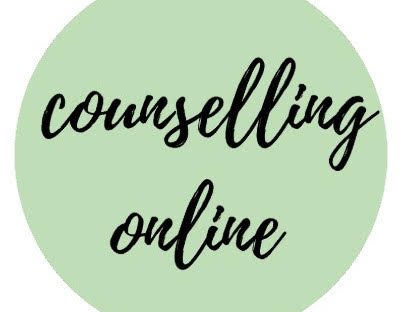
Taking a leap of online faith
Counselling online: two words that struck fear into my heart not so long ago! But now, five or six weeks in, it feels completely normal to meet up each week with clients on Zoom. Incredible how life can change in a heartbeat, and amazing our capacity to all adapt.
Will online ever be my preferred method of working, over face-to-face? Perhaps not. In an ideal world, there’s nothing like actually sharing the same space and time with another human being, and being able to read each other’s verbal and non-verbal cues and nuances first hand. But in the absence of this as a possibility, online working has proved itself to be a massively viable and cracking alternative, and I’m grateful not only for the technology which makes this possible, but to the people I meet on screen each week who have also been willing to take that leap of faith.
- 4 May 2020
Counselling online: two words that struck fear into my heart not so long ago! But now, five or six weeks in, it feels completely normal to meet up each week with clients on Zoom. Incredible how life can change in a heartbeat, and amazing our capacity to all adapt.
Will online ever be my preferred method of working, over face-to-face? Perhaps not. In an ideal world, there’s nothing like actually sharing the same space and time with another human being, and being able to read each other’s verbal and non-verbal cues and nuances first hand. But in the absence of this as a possibility, online working has proved itself to be a massively viable and cracking alternative, and I’m grateful not only for the technology which makes this possible, but to the people I meet on screen each week who have also been willing to take that leap of faith.
- 4 May 2020
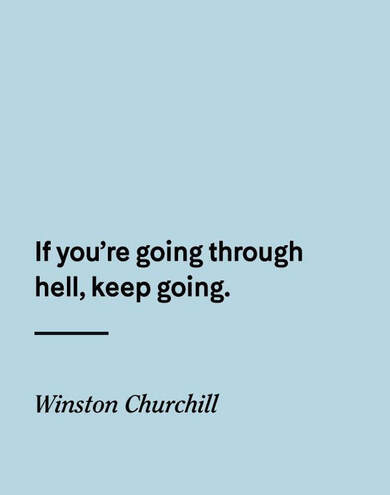
Keep going, you'll get there
This is the quote I have probably held most dear - through tough times in my own life, or when supporting clients as they navigate their way through their own difficulties and suffering.
The more I think about this sentence the more I love it, primarily because it’s really just saying ‘Look, this is bad, you can’t stay here, keep moving, find a way out’. It encourages forwardness, autonomy, and tells us that - whatever ‘hell’ means to us each personally, it will pass. Nothing stays the same. Everything has an end and change will come, no matter how bleak the feelings that we’re sitting with right now.
Hold tight, seek support, keep going, you’ll get there.
- 30 April 2020
This is the quote I have probably held most dear - through tough times in my own life, or when supporting clients as they navigate their way through their own difficulties and suffering.
The more I think about this sentence the more I love it, primarily because it’s really just saying ‘Look, this is bad, you can’t stay here, keep moving, find a way out’. It encourages forwardness, autonomy, and tells us that - whatever ‘hell’ means to us each personally, it will pass. Nothing stays the same. Everything has an end and change will come, no matter how bleak the feelings that we’re sitting with right now.
Hold tight, seek support, keep going, you’ll get there.
- 30 April 2020
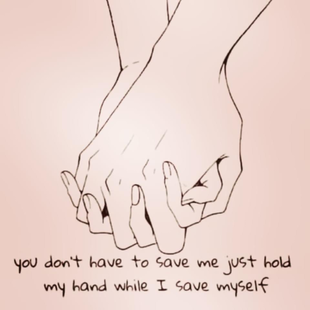
Just hold my hand whilst I save myself
I love these simple images .... they entirely depict how counselling should be. We all need a helping hand at times - whether that’s practically, emotionally, physically or otherwise. But that doesn’t mean that we want or need to be ‘saved’. Healing and empowerment comes from saving ourselves.
My type of counselling believes (and I’m a fully paid up member of this corner stone) that it is within each of us to find and know what it is that is causing us distress or difficulty'. Not only that, we also know how to get ourselves out of it, even if we don’t realise it yet. It can take a bit of time and a bit of soul searching to get back to who we really are and what we really need. My job is to gently support and help enable that process. I know about counselling, and you know about you. Collaboration is everything ..... and I’ll bring the torch.
- 26 April 2020
I love these simple images .... they entirely depict how counselling should be. We all need a helping hand at times - whether that’s practically, emotionally, physically or otherwise. But that doesn’t mean that we want or need to be ‘saved’. Healing and empowerment comes from saving ourselves.
My type of counselling believes (and I’m a fully paid up member of this corner stone) that it is within each of us to find and know what it is that is causing us distress or difficulty'. Not only that, we also know how to get ourselves out of it, even if we don’t realise it yet. It can take a bit of time and a bit of soul searching to get back to who we really are and what we really need. My job is to gently support and help enable that process. I know about counselling, and you know about you. Collaboration is everything ..... and I’ll bring the torch.
- 26 April 2020
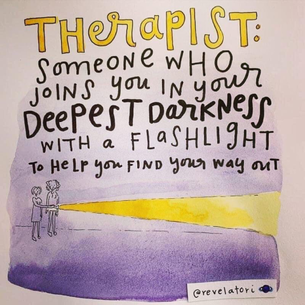
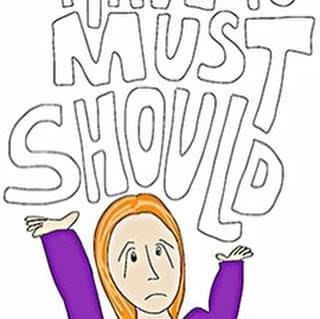
Being mindful of 'musterbations'
‘Musterbations’ .... (I know, I did a double take the first time I heard it too) .... words like ‘must’, ‘should’ and ‘ought’ ... as in ‘I must pull myself together’, ‘I should be over this’, ‘I ought to be on the other side by now’.
Sometimes a metaphorical kick up the bum is useful. And sometimes it’s deeply unhelpful. Musturbations tend to make us feel worse than we already do. ‘I should be over this (but I’m not)’, ‘I ought to be over this by now (but I don’t feel it)’, ‘I must pull myself together (but I can’t)’ ..... and that’s because the trauma or the loss or whatever presenting issue it is that is troubling the client has yet to be resolved for that person.
So the message is be mindful of musterbations ..... they can act as a stick to beat ourselves with when we are already feeling low, and nobody needs that. Instead concentrate on the words that come after the ‘but’ in any musterbation sentence. That’s where our work is.
- 23 April 2020
‘Musterbations’ .... (I know, I did a double take the first time I heard it too) .... words like ‘must’, ‘should’ and ‘ought’ ... as in ‘I must pull myself together’, ‘I should be over this’, ‘I ought to be on the other side by now’.
Sometimes a metaphorical kick up the bum is useful. And sometimes it’s deeply unhelpful. Musturbations tend to make us feel worse than we already do. ‘I should be over this (but I’m not)’, ‘I ought to be over this by now (but I don’t feel it)’, ‘I must pull myself together (but I can’t)’ ..... and that’s because the trauma or the loss or whatever presenting issue it is that is troubling the client has yet to be resolved for that person.
So the message is be mindful of musterbations ..... they can act as a stick to beat ourselves with when we are already feeling low, and nobody needs that. Instead concentrate on the words that come after the ‘but’ in any musterbation sentence. That’s where our work is.
- 23 April 2020
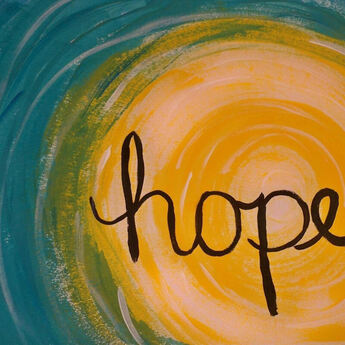
Lean into hope
Hope ... the most beautiful of words, and the thing that keeps us going in all kinds of situations. Hope can be the last feeling left standing when we find ourselves at our lowest ebb, even if it’s glimmer is dulled. Hope for better, hope for change, hope for a bit of inner peace.
For me, that beautiful four letter word is linked to what humanistic counsellors believe is our undeniable drive to be the best we can be, irrespective of the conditions or circumstances we find ourselves in. Sometimes we lose sight of that, and sometimes things get in the way, but that innate force is always there, quietly working away in each of us. So for anyone in need of a reminder, have faith and lean into hope 💛 - the sunshine of emotions.
- 21 April 2020
Hope ... the most beautiful of words, and the thing that keeps us going in all kinds of situations. Hope can be the last feeling left standing when we find ourselves at our lowest ebb, even if it’s glimmer is dulled. Hope for better, hope for change, hope for a bit of inner peace.
For me, that beautiful four letter word is linked to what humanistic counsellors believe is our undeniable drive to be the best we can be, irrespective of the conditions or circumstances we find ourselves in. Sometimes we lose sight of that, and sometimes things get in the way, but that innate force is always there, quietly working away in each of us. So for anyone in need of a reminder, have faith and lean into hope 💛 - the sunshine of emotions.
- 21 April 2020
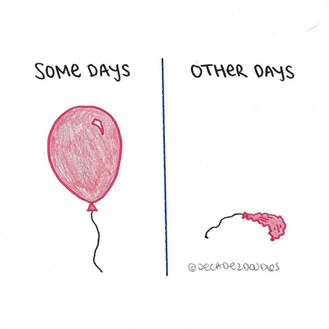
Riding the rollercoaster
I heart @decade2doodles. She captures brilliantly the weird thing that is feeling great one day and pants the next, and makes that what it is – okay.
In these surreal times, when many are suffering and the rest are left trying to live as ‘normal’ a life as possible, the see-saw between ‘great’ and ‘pants’ can feel accelerated.
Today, I’m leaning a little towards the deflated balloon on the right (thought: probably something to do with relaxing of work, routine, exercise at the weekend …) but tomorrow will be different, and that’s okay.
Take care everybody. Happy Sunday.
- 10 April 2020
I heart @decade2doodles. She captures brilliantly the weird thing that is feeling great one day and pants the next, and makes that what it is – okay.
In these surreal times, when many are suffering and the rest are left trying to live as ‘normal’ a life as possible, the see-saw between ‘great’ and ‘pants’ can feel accelerated.
Today, I’m leaning a little towards the deflated balloon on the right (thought: probably something to do with relaxing of work, routine, exercise at the weekend …) but tomorrow will be different, and that’s okay.
Take care everybody. Happy Sunday.
- 10 April 2020
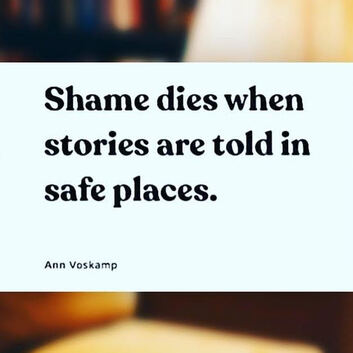
Shining a light on shame: exposure therapy
Times like these tend to bring out the very best and the very worst in us humans don’t they? In a week in which there has undoubtedly been much kindness, strength, bravery and gentle neighbourliness, I crossed paths with somebody, a stranger, who may well have been having a bad day. Long story short, she flung an insult which was intended to demean and humiliate. It worked. Despite trying to shake it off (understatement alert: people are obviously going through far, far, far worse at the moment), I’m a little embarrassed to say that I was left feeling quietly shocked, upset and ashamed.
But here’s the thing. The next day I started talking about what had happened with the stranger. I got it out, I had a good look at it, I saw it for what it was and I decided I didn’t want it. The thing about shame - my least favourite of all the human emotions because it acts as a straight-jacket - is that it doesn’t like to be exposed. It really can shrivel up if brought out into the light. And the other thing about shame is that it can so easily be projected by those with need to transfer whatever it is that’s going on for them.
So the moral of this story? If someone or something attempts to hand you shame, shine some light on it - you do not have to accept it.
- 17 April 2020
Times like these tend to bring out the very best and the very worst in us humans don’t they? In a week in which there has undoubtedly been much kindness, strength, bravery and gentle neighbourliness, I crossed paths with somebody, a stranger, who may well have been having a bad day. Long story short, she flung an insult which was intended to demean and humiliate. It worked. Despite trying to shake it off (understatement alert: people are obviously going through far, far, far worse at the moment), I’m a little embarrassed to say that I was left feeling quietly shocked, upset and ashamed.
But here’s the thing. The next day I started talking about what had happened with the stranger. I got it out, I had a good look at it, I saw it for what it was and I decided I didn’t want it. The thing about shame - my least favourite of all the human emotions because it acts as a straight-jacket - is that it doesn’t like to be exposed. It really can shrivel up if brought out into the light. And the other thing about shame is that it can so easily be projected by those with need to transfer whatever it is that’s going on for them.
So the moral of this story? If someone or something attempts to hand you shame, shine some light on it - you do not have to accept it.
- 17 April 2020
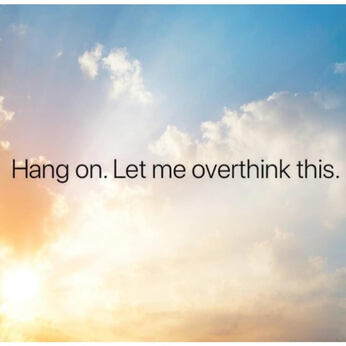
Escaping the stuckness
Anyone else prone to a little ‘overthinking’? It’s actually a word I’m not terribly fond of as it tends to be used as a ‘belittler’ of own thoughts.Thinking is thinking. However, sometimes we can become a little stuck in a cycle of thoughts which can be unhelpful and seem never ending.
Talking helps: getting ‘it’ out and having a good look at what’s troubling us, working out whether the thoughts have merit and if there’s anything to be done. Also useful is to think of the brain as having two halves, the emotional and the rational, and applying our thoughts to both. Finding balance between the two can relieve ‘stuckness’ (technical term!) and bring a little inner peace. And isn’t that a lovely thought.
- 15 April 2020
Anyone else prone to a little ‘overthinking’? It’s actually a word I’m not terribly fond of as it tends to be used as a ‘belittler’ of own thoughts.Thinking is thinking. However, sometimes we can become a little stuck in a cycle of thoughts which can be unhelpful and seem never ending.
Talking helps: getting ‘it’ out and having a good look at what’s troubling us, working out whether the thoughts have merit and if there’s anything to be done. Also useful is to think of the brain as having two halves, the emotional and the rational, and applying our thoughts to both. Finding balance between the two can relieve ‘stuckness’ (technical term!) and bring a little inner peace. And isn’t that a lovely thought.
- 15 April 2020
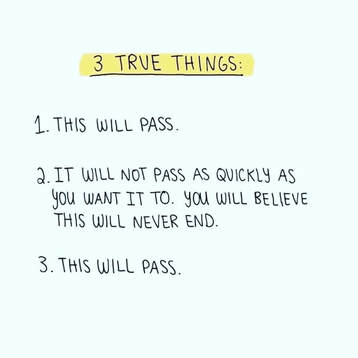
This too shall pass
Whether we're talking about the Coronavirus situation or recovering and healing from a difficult or traumatic experience, this little visual applies. Nothing stays the same, the world keeps turning, better times will return. Happy Easter one and all, stay safe and well.
- 12 April 2020
Whether we're talking about the Coronavirus situation or recovering and healing from a difficult or traumatic experience, this little visual applies. Nothing stays the same, the world keeps turning, better times will return. Happy Easter one and all, stay safe and well.
- 12 April 2020

Plough your own furrow
Walks are now even more of an important part of my daily self-care than they usually are. This field today, with its beautifully worked earth, reminded me of a saying taught to me by a lovely friend: ‘plough your own furrow’, meaning don’t worry what others are up to, focus on your own life, eyes inwards.
A great sentiment perhaps for when feeling anxious or overwhelmed, and in need of finding yourself again.
- 10 April 2020
Walks are now even more of an important part of my daily self-care than they usually are. This field today, with its beautifully worked earth, reminded me of a saying taught to me by a lovely friend: ‘plough your own furrow’, meaning don’t worry what others are up to, focus on your own life, eyes inwards.
A great sentiment perhaps for when feeling anxious or overwhelmed, and in need of finding yourself again.
- 10 April 2020
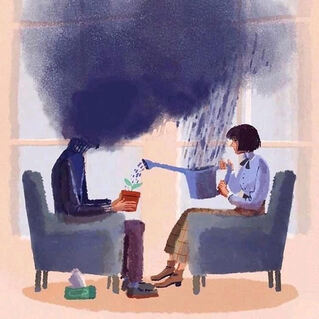
Adapting to change
Two months ago a [wonderful] doctor explained Coronavirus and it’s likely impacts to me. She suggested that I would have to learn how to work on-line, and quickly. Safe to say I was pretty horrified by everything we discussed that day. The world has changed since that conversation, including the way so many of us now work and interact. I’ve learned that some things, however, stay reassuringly the same, including our need to communicate and that the principle of counselling (as depicted here) remains unchanged.
- 8 April 2020
Two months ago a [wonderful] doctor explained Coronavirus and it’s likely impacts to me. She suggested that I would have to learn how to work on-line, and quickly. Safe to say I was pretty horrified by everything we discussed that day. The world has changed since that conversation, including the way so many of us now work and interact. I’ve learned that some things, however, stay reassuringly the same, including our need to communicate and that the principle of counselling (as depicted here) remains unchanged.
- 8 April 2020



